#that it's just the typical fandom behavior of villainizing female characters
Explore tagged Tumblr posts
Text
IMO the thing about Hoder is that her thoughts, feelings, motivations, and actions are left somewhat ambigious by the game, both due to how little screentime she gets and the open-ended nature of Kingdom Hearts' storytelling. Because of this, there are multiple ways that you could interpret her character, and I would argue that, for the most part, these various interpretations are all equally valid within the framework of what the game gives us (because after all, it's not like the game gives us a lot to work with in the first place.)
Is her professed belief in the inherent light of people's hearts a genuine representation of her thoughts, or something she said to ease the concerns of her bickering classmates, knowing full well that her declaration was overly-optimistic? When she snuck off to confront Maleficent by herself, did she have battle on the mind, or was she just planning to negotiate with her? Who instigated the fight, a righteous Hoder or an enraged Maleficent? When she tried to inform her friends that Baldr needed help as she died, was she aware that he had been possessed by darkness, or was it unclear to her what exactly was wrong with him? When she asked Xehanort to house her heart in his and transport her to Baldr, was it truly because she was worried about her brother, or because she felt it was her responsibility as his sister to put an end to his chaos? When she offered Baldr an olive branch upon reuniting with him at the end of the game, was she hoping that her kind words would convince him to stand down, or was it all just a ruse to get close enough to kill him? Who decided to turn on the other first? Or did they turn on each other simultaneously, both equally driven by distrust and paranoia? Heck, what was her sibling relationship to Baldr even like? Because the game certainly doesn't show it to us in any greater detail. And considering all the parallels the game draws between her and Eraqus, just how much of her personality and ideals can we glean from Eraqus'?
Personally, I love flawed and messy characters, especially if they're women. Extra especially if they're technically on the side of good. So while I do try to strike a balance with how I interpret her, I can't deny that I have a fondness for some of the darker possibilities, pun not intended.
#khdr#kingdom hearts dark road#kh hoder#rambling about dim path#ch tag: hod#ch tag: bal#I always wonder if people look at these darker interpretations of Hoder's character and assume#that it's just the typical fandom behavior of villainizing female characters#Which don't get me wrong is a perfectly valid concern to have but#I can't speak on behalf of others but at least for me anyway that's not my intent in the slightest#It just makes sense to me that they would BOTH be kinda messed up and misguided ppl. Both negatively impacted by what they've been taught.#I think it also makes their sibling relationship WAY more interesting#Thinking about the potential tension that existed right beneath the surface. Unacknowledged.#khdr spoilers
23 notes
·
View notes
Note
I've talked about this as well and yeah, I do think things would've been easier on the fandom overall if they made it more clear. The whole "Edelgard's adorable side uwu" detracted heavily from her role as a villain, which they claim they did knowingly and on purpose on both accounts.
As someone whose fave char in the whole franchise is Alvis, I can definitely say he did things wrong lol. Difference being, he did his best to take responsibility for it (something Edelgard never does and refuses to do, which maybe have been intentional on the writers' part, but the way they handled it ruined it).
Also, to comment on the sexism aspect. part of what makes it sexist isn't just the fact that "women can't be bad", but more that pretty women can't be written as horrible villains. FE4 Hilda and Petrine are perfect examples of heartless, selfish villains, and they're not written nor drawn to be attractive. They also don't have sad backstories or try to uwu at the player (even through dialogue in general and not just with a player character). Basically, beautiful women can't be bad and the typical villain female look is made to not look beautiful. That in itself is sexism.
It's no wonder why in the next game, Sombron doesn't sing a jpop song and you can't side with him (willingly!), or why the people turned into zombies aren't sidelined and ignored like Baldo'n'Waldi - we returned to a tradition non wank state where selling alts, cards and tea bags isn't more important than telling a story, regardless of what you think of said story.
He's not a beautiful lady, so nobody cares about that anyway! Since the villain is male, he can still be a villain.
Of course we have funny people pushing a Lumera BaD narrative, but it's not to defend of absolve Sombron of any wrongdoing or to treat him with gloves, somehow, it's still used to defend Supreme Leader (that's why those people are funny!).
I've actually heard of this, though more mildly since I don't interact with the Engage fandom at large. It basically sums up to Lumera is a dragon so automatically BaD, but I'm sure people use the totally!not!Risen! Lumera to be the "true" Lumera, since she's basically lolcalized!Rhea 2.0.
Regarding the dragon aspect, I've also heard that Supreme Leader stans basically had a meltdown at having to play a dragon as the main character and couldn't fathom the idea that Dragon GooD, apparently feeling like their lives were flashing before their eyes. Apparently it was their first real of taste of Dragon GooD and the idea that you can't judge an entire race of people to all be explicitly good or bad as a whole, and that individuals with their own actions/behavior is actually a thing, as opposed to the very unfortunate real life idea that entire races all behave in xyz way or think in xyz way.
Thus, of course, they must direct their attention to absolutely anything they can get their grubby and war-bloody hands on to continue to prove their points about their pixel waifu, including taking another entry in the series with them that has nothing to do with their waifu in the first place.
Do you believe it would have been better for the state of the fandom if CF had ditched any attempts at subtlety and just made it clear and undeniable that it was a villain route?
I don't doubt there'd have been people trying to argue against it even then (Arvis was a hero who did nothing wrong interpretations of FE4's story come to mind), but it'd have significantly reduced how widespread the Edelgard wank would have been; the Fódlan stories themselves would also have been significantly improved if they didn't need to treat Edelgard with kids' gloves at every opportunity, so it'd even work as a 2-for-1 in making the Fódlan games better.
Hahaha,
Talking with a friend and musing about this verse - Fe Fodlan has always been about "uwu or not uwu" regarding the Red Emperor, and you can't sell Ashnard slapping his ass (I'd buy it) or Walmart in a nightgown (I wouldn't buy it) in heroes or in Cipher.
That's the, say, spinal cord of the Fodlan Verse, at least, how it was developed by the devs.
So to sell this merch, but also, with the usual brand of sexism and "women can't be BaD", we end up with... a route where you side with Supreme Leader that is extremely white-washed (no angry civilian/random asking for reparations! When Dimitri deals with Flèche!), Rhea roasts babies and they both lose because the plot commanded them to.
To be honest, after taking into account the rest of the game(s) I'm still surprised Tru Piss has so many red flags and clues and general enemy lines showcasing how this route is, well, the one that ends up with deadeyesfish!Billy.
Sure SS was supposed to be the Billy Route, but since Rhea BaD and Church BaD (as you are hammered every time!) it makes Supreme Leader not so BaD - and with Rhea (and the BL!) being a scapegoat to sell Supreme Leader as she was intended, I don't think any amount of subtletly would have saved, not Tru Piss, but the fandom who swallows everything Tru Piss says.
In a way, Tru Piss suffers from two opposites directions, make a villain route - as to not shoot the lore/worldbuilding (SS) - but also, remember to make Supreme Leader sellable. So it couldn't be a villain route, and they tried to fit every mention of it being a "shouldn't have picked that" route in the lore/background/other convos, so they got their cake and ate it.
But yep, Fodlan verse wouldn't be Fodlan verse if Supreme Leader was treated like Ashnard, because Supreme Leader and her "uwu betrayal" were at the core of the Fodlan verse.
Nopes dropped the "betrayal" aspect, but still, she's not supposed to be the clear cut villain - even if her actions, and the world building, and the genocidal death cult she works with say the contrary - so her enemies will be demonified (Dimitri kills people! omg so bad! - and Nopes ends with somehow everyone agreeing to kill Rhea on the Zahras chapters).
Many people already tried to explain why the fandom wank took as it did regarding Supreme Leader - but imo that's what the devs gunned for.
It's no wonder why in the next game, Sombron doesn't sing a jpop song and you can't side with him (willingly!), or why the people turned into zombies aren't sidelined and ignored like Baldo'n'Waldi - we returned to a tradition non wank state where selling alts, cards and tea bags isn't more important than telling a story, regardless of what you think of said story.
Of course we have funny people pushing a Lumera BaD narrative, but it's not to defend of absolve Sombron of any wrongdoing or to treat him with gloves, somehow, it's still used to defend Supreme Leader (that's why those people are funny!).
#Three Houses#FE16#Fodlan#sorry anons that I keep hijacking Random's asks lol#we just are usually on the same page with this stuff and also#me and Random don't always agree so it's fun to discuss with stuff with her#(and this has been ongoing for years with us discussing different viewpoints!#in fact I think Lachesis or the Velthomers was our first discussion?)#hell I'm pretty sure she doesn't even rly vibe with my favorite dragon in the franchise lmao#we have these long running gags of her making jokes against him and me responding#we've been mutuals for at least like five+ years now lmao we're unhinged at this point#we both just hijack each other's posts from time to time. power of being mutuals for so long#also like we both discuss primarily Fodlan and Tellius so even after all these years (Jugdral previously)#we're still on the same page talking abt the same games lol
17 notes
·
View notes
Text
On Itachi, his fandom, and moral standpoints
Once again I come back with a meta, unsurprisingly, of Naruto’s manga and, more specifically, about a character in particular, Uchiha Itachi, his fandom and what it entails and represents. My decision to make him the primary focus of this meta is just to bring light (open the door for more in depth debates) of a deeper, much more complicated problem that Itachi represents, but undoubtedly surpasses him and the Naruto manga as a whole.
Be warned, my take on Itachi’s fandom does not contemplate those fans who merely enjoy him but do not negate important parts of his character, if that’s your particular case, then be assured that I did not have you in my mind when writing this. This is about, let’s say, the hardcore fandom he possesses, that justifies (and to some extent, celebrates) his implications in the UCM and blindfold loyalty to Konoha and its system.
How can I even begin to introduce Itachi’s character? What he was supposed to be and what he surprisingly became? How to start to explain his fenomenon? Itachi was not supposed to be good, from his introduction he was a manipulative, dark character that tortured physically and mentally Sasuke and was a threat to Naruto’s (the protagonist) life. At no point during the first part of the manga were we able to see glimpses of a “good” Itachi that the narrative later on tried to establish, and yet, there were three (conected) factors of imperative importance to understand the raise of his character from the first part of the manga to the other.
The first one was, let’s call it, his intrinsecal persona's appeal (and everything it encompases).
Itachi’s not the first cryptic male character that gets favored by a large part of the fandom for that mere trait (look at any shönen or show and see how many characters whose sole trait is to be mysterious becomes the fandom’s favorite), added to the fact that he’s powerful enough to subdue men who’s status of geniuses are often highlighted in the manga (Orochimaru and Kakashi), and his... physical charm, you have a powerful combo to make readers incline more and more on his favor. Itachi had sparked their interest.
There are boxes to fill to attract the public interest to a character, and Itachi filled in all of them.
The Power-Mystery-Beauty triangle is not an unknown formula (Christian Gray, Edward Cullen, to name characters from mainstream, from other manga there is Light, now surprisingly, Dabi) and in every fiction work it has appeared, it worked to lure the (female) public towards it.
But is that enough? For some, yes, for most, Itachi represents something that they desired profoundly, and that’s entirely attached to Sasuke’s character.
Even back in the first part of the manga, Sasuke’s character was received mixedly, there were people who saw his personality as too abrasive (similar to Itachi’s but because Sasuke was supposed to be with the nice guys, this aspect of him clashed rather harshly with his position on the narrative) and considered him a mere emo who believed himself to be better than Naruto and Sakura (he was, but he also acknowledged this fact, which make some readers disapprove of him even more).
Itachi challenged that “so-called” superiority, additionally downgrading and humiliating him in a way readers felt he, to some extent, deserved. The dislike of part of the fandom of Sasuke’s character found a way of purchase inside the manga. Naruto wasn’t strong enough (and eventually cared too much) to subdue Sasuke, Sakura was too in awe with him to “stand up against him”, Kakashi saw his greatness and taught him powerful jutsus while paying zero attention to his other students. Until Itachi, no other character seemed to put Sasuke “in his place”, because even the villains of each arc seemed particularly obsessed with Sasuke and Sasuke only, elevating even more his importance and status and sidelining Naruto and (of course), Sakura, who were left with mere participations in what seemed a Sasuke-focused plot. Up at this point, Sasuke was far more important than the actual protagonist of the manga but Itachi, who was actually Sasuke’s goal, who was actually the person Sasuke aspired to surpass, abused him, manipulated him and -more importantly- seemed more focused on getting Naruto -hence, retribution: the only person Sasuke seemed to care about didn’t seem care about him at all.
Itachi’s coolness, strength and mature handsomeness (that Sasuke did not present until Shippuden, but Itachi was literally introduced with), plus the dislike of Sasuke’s character and the belief that he needed to be rectified, the reason of which will be brought up next, appealed the teenage fandom in a way strong enough to catapult him inside the popularity polls just right after his presentation.
The Self-inserts inside Itachi’s fandom
As I introduced, a large part of the fandom back in the first part already, and in Shippuden particularly, had a deep dislike of Sasuke’s character and wanted him to suffer -to be beaten, to be “owned”, Itachi’s character fulfilled that wish, which takes me to the second factor.
You can’t explain this point in particular without adding the “self-insert” and “reader-insert” notions that often gets attached to Itachi (Sakura, Naruto and Hinata) fans,
“Self-insertion is a practice by authors of writing themselves into their own stories, either explicitly or in thinly-disguised form; in a fannish context this most often means fan writers writing themselves into their favorite source material so that they can interact with canon or its characters” (X)
Whilst
“Reader-Insert is a type of fanfiction, almost always written in 2nd person Point of View; the protagonist is always the reader, and is usually paired with one of the canon characters. "Reader-insert" typically has a hyphen hyphen, but is also known as Canon X Reader (sometimes CanonXReader).” (X)
In this particular case, many readers had succumbed to something slightly in between. The manga doesn’t belong to them, so the only one in position to literally self-insert is Kishimoto (canonically), so they are left with the option of attaching themselves personally to a pre-existed character with whom they feel somewhat represented. If not, then at least they attach emotionally to a character because it represents what they desire (this can be more observed in the shipping part of the fandom). Meaning, they use a canon established character that is not literally the reader, but who clearly represents them or represents what they want in their significant (romantical) other.
Sakura was the only female lead who had a crush on the cool guy, readers (particular female ones) didn’t need much to feel a connection with her (during the first part, Kishimoto didn’t even give them much to do so, but they still attached to her with the prospect of what she might become), while Naruto was the dead last, it appealed to those who also felt that they weren’t popular or were mistreated by their peers.
But what the self-inserts of Sakura or even Naruto had to do with the increasing love for Itachi?
To explain this in a way that can be understandable: Sakura fans who believed Sasuke disrespected her when not acknowledging her feelings or when downgrading her skills often turned their attention to the man of similar physique and strength to fulfill their fantasies of reciprocation -because canonically, Itachi had neither rejected, nor downgraded her character. In the same fashion, Naruto fans who believe Sasuke is egotistical by not caring for/acknowledging Naruto in the same manner he does (hence, not deserving him), tend to also indulge in the same type of behavior previously mentioned.
Later on, when the narrative introduces the idea that Itachi stands alongside Konoha (Naruto and Sakura), thus, against Sasuke (from an idealistic standpoint), this particular practice deepens, grows. They feel validated on their idea that Itachi will treat their favorite character (them) better, while at the same time punishing Sasuke for rejecting them.
There are not many cases of Itachi self-inserts, I’m not denying their existence however because he did fulfilled a wish many readers had (against Sasuke), but Itachi’s self-insert part of the fandom seems to be more in terms of female character fans that desire their favorite kunoichi to be loved/desired/respected? by a powerful, handsome, mysterious character.
Sasuke’s importance in the narrative (and character growth)
Sasuke escaping Konoha to get to Orochimaru, train, and become strong enough to defeat Itachi and avenge his clan won’t hold up for the four hundred or so chapters Naruto Shippuden lasts. After Itachi’s defeat at his hands, Sasuke had no reason not to return to Konoha, more importantly, he had no reason to fight Naruto as it was the intention and ultimate and most important clash in the manga since the introduction of their rivalry.
Sasuke’s growth as a character (that I spoke more detailed in this post) was tied to the introduction of a deeper, more important problem: Konoha’s involvement in the UCM. It wasn’t new in Naruto to present the dichotomy and harsh truths of the shinobi system (Hyuga clan, Haku, Jinchurikis), and the intervention of Konoha’s government in the massacre of the Uchiha clan provided the narrative with a reason to have both Sasuke and Naruto fighting in different sides of the battlefield, but also presented a deeper problem: Itachi couldn’t be bad.
He couldn’t stand in the “bad” side of the field because both, that would put Naruto (the hero) in the same morally bad position, and Itachi's fandom (which was massive), was eager for redemption, they demanded it, and Naruto is not a manga that doesn’t get influenced by what its purchasers want. In consequence, they needed to justify Itachi’s actions. We can talk about how abysmally bad they did it, we can talk about how much better this problem could have been sorted out, but that is not the core of this post.
Kishimoto loved Sasuke, I have said this before, despite the fandom wishes, he stood his ground when it came to Sasuke and his revolutionary position until the very end. Maintaining that ideal as just, put Naruto (hence, Itachi) in the wrong. But because the narrative needed Naruto to be good and in the right, he ended up justifying genocide by justifying Itachi.
Consequently, and with the appeal he earned with his introduction and the Sasuke-hate (self-inserts), Itachi became a favorite character amongst favorite characters despite being a plot holes with legs. Readers eagerly consumed whatever panel proved that Itachi was not the bad guy he was previously believed to be. (proved or at least didn’t show, Itachi still commited genocide, but we don’t get to see such attrocities so its easier to forget he slaughtered innocent people, children amongst them). Readers who liked him were desperate for the narrative’s validation.
Core of the issue
Which brings me to the core of the post and in retrospection, I have already presented it: moral standpoints. This is not new, I’m not introducing any new idea, and this is hardly something that happens solely in the Naruto’s (and most specifically Itachi’s) fandom. Liking or not a character is tied to so many subjective variables that it’s hard to pinpoint exactly what makes a character desirable or despicable despite solid traits being commonly shared on particular troups. And yet, liking or not a character became a moral standpoint for which people judged each other on a personal level. It has happened since always, but the internet did nothing but make more accessible and public this type of clashes. Therefore, Redemption Arcs became the most precious gem inside fictional works and Naruto fell for it, and fell hard.
It’s almost mandatory to have the narrative’s validation in order to enjoy a character freely and Naruto provided it to Itachi’s fandom. His actions were justified by the manga and the most important (and beloved) characters stood by his side, even those who were victims of him forgave his actions because there was someone (with less appeal and more morally questionable actions under his belt) to blame further. Having the narrative’s moral validation is more important than actually being in the right.
Itachi was manipulated by the Will of Fire who he learned from Hiruzen who was passed to him by Tobirama who created it because he was raised during the Warring States Period, so his apprehension to the Uchiha was justified. It’s a train of justifications that ultimately holds no one responsible for the genocide of an entire clan/race which then becomes something bound to happen. So to save face, they use an escape goat: Danzo and the Curse of Hatred. They put the blame of the massacre to a single character and the actual victims because, well, they were genetically prone to disaster and killing them was the only way to ensure (temporary) peace.
Liking a character doesn’t automatically mean condoning its actions but because that subjective appeal became more and more the reflection of the reader’s ideals (for some reason I’m not here to trace), those two actions merged, which translated consequently into demanding the narrative’s validation of our tastes. There’s no denial of the pleasing sensation that comes with having the plot’s endorsement for liking a complex/morally gray or even dark character, but that approval turned to be the most important/valuable requirement, which, in turn, made readers justificate (supported by the narrative) despicable actions, such as genocide.
Let’s go back to the second bullet point, self- inserts, as to discern more in depth their reasons to look for a justification on Itachi’s character: Itachi (an Uchiha that was not affected by the Curse, as his peers were) who the narrative proclaims wanted his brother’s safety and happiness above all things, stands morally with Konoha (hence, the readers’ favorite character). Therefore, justifying his actions is justifying Sakura and Naruto’s actions against Sasuke (manipulation is alright because Itachi did it, trying to kill Sasuke because he didn’t want to bend to their will is alright because Itachi did it), it gives them reasons to believe that they are on the right side of the battlefield, it gives them moral superiority. They’re in the right, they are good people, Sasuke was too deep in his hatred to either see it or correspond their feelings and that’s why he needs to be saved, and who more appropriate to do so than the two characters that were mocked by him during the first part of the manga? Even in the end, Itachi still gives them the retribution they still feel deserve and that Sasuke -still- didn’t give.
#naruto#naruto meta#anti itachi uchiha#anti itachi#anti sakura#anti sakura haruno#anti sakura fandom#anti naruto uzumaki#anti naruto#anti naruto fandom#anti itachi fandom#sasuke uchiha#sasuke#pro sasuke#anti konoha#anti shinobi system#this will probably be edited
300 notes
·
View notes
Text
You know what I am really fucking tired of seeing in popular media?
The "evil, hysterical woman in power" trope. The clichè that potrays women who are in a position of power as overzealous, unhinged, power hungry maniacs who are a ticking time bomb waiting to explode.
Female leaders are shown as less resonable and down to earth as their male counterparts, and are often villainized by either the fandom or the narrative of the story itself. They are doomed to fail because of their womanliness and need to be taken down before they enact their evil plans, preferably by a man, or a woman who performs the 'right' kind of femininity.
This trope relies on the sexist misconception that women are more fragile than men, more emotionally unstable and unpredictable.
"Women aren't cut out to be leaders, they should be nurturing and supportive and tend to their families. Having higher aspirations is against their nature and will eventually break them and drive them crazy."
That type of bullshit that was designed to keep women out of leadership positions and keep oppressing us. To keep us quiet and submissive.
Here are a few examples to further explain this stereotype:

Daenerys Targaryen is one of the most well known characters to fall victim to this trope. She is an abuse and rape victim, seeking to change the current social and political systems of the world because she knows how many people suffer under its injustice. ("Crush the wheel.")
For all her compassion and charity she has shown over the series, the writers decided that it would be reasonable for her to go crazy at the end of the show and, despite promising she wouldn't inflict more damage than necessary, kill thousands of innocent people whose government had already surrendered to her.
And guess who had to kill her in the end? Yup, another man. Her love interest, who was "forced" to betray her.
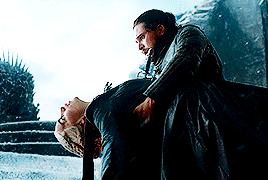
Next, we have:
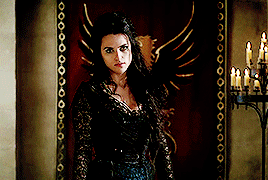
Morgana Pendragon, from "Merlin". To remind you, she is an abuse victim who had to endure her father's controlling behavior and bigoted attitude towards people with magic abilities which, suprise suprise, she turned out to have. She had to watch as her father murdered and oppressed people just like herself, and when she challenged that behavior, he would come down hard with punishment. (Going so far as to actually throwing her in the dungeons for a couple days.)
Eventually, she rebelled against the corrupt system and had her genocidal father killed. She led a rebellion against Camelot after Uther's son (Arthur) continued to oppress magicians under his reign, and sought to create a better future for herself and her people.
So far so good, right? Well, no. The problem here is that she is the antagonist of the story. She is portrayed as being in the wrong for not quietly taking the injustice and watching it happen.
Halfway through the show, she becomes obsessed with power and status and desperately chases after the throne of Camelot. She is extremly vindictive, manipulative and cruel to others to archieve her goals. She is a "hysterical woman" who is out of control, emotionally unstable, challenges the patriarchy, and therefore needs to be defeated.
Her death was portrayed as tragic, yet absolutely necessary.
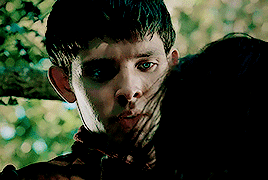
(Of course it had to be a man who killed her.)

Azula is the epitome of this horrid, misogynistic trope. She is a fierce, ambitious leader and highly skilled fire bender, respected and feared among her people. She is highly driven and succeeds at almost everything she sets her mind to.
Ever since she came into this world, she was better at everything than Zuko. She was a better fighter than him, a better bender, better strategist, better child. And that is precisely the reason why she had to lose in the end.
Despite coming from the exact same circumstances as Zuko, the story and the fandom at large see Azula as way less redemable and likable than him. Even though she is an abuse victim whose own mother hated her and is a literal child soldier, she doesn't get any sympathy from the protagonists of the story. The otherwise so understanding and wise Iroh even calls her "crazy", (which is, if you've done some basic research into misogynistic expressions, really fucking problematic.) and tells Zuko that there is no saving her. Why? He doesn't tell, but it's obvious that the writers made him say this because of their own internalized sexist beliefs. She isn't offered a way out of her toxic environment like Zuko was. She didn't get the support from Iroh because he had already given up on her.
To top it off, she has a nervous breakdown near the end and loses her remaining sanity. Because, you know, "She's craaaazy!! And SO unstable!! Typical woman." (Not to mention how this further stigmatizes mental illness and portrays it as something only evil people get.)
She was supposed to become the next fire lord, a position that carries utmost power and influence. Of course, such authority could not be given to a woman. That's why Zuko, a man, gets to be the next fire lord, and we are left assuming Azula will be spending the rest of her days in prison.
The writers assume the audience detests Azula and wants her to suffer. She doesn't deserve a happy ending, or the love and support that Zuko got.
Why? Because she poses a threat to the status quo, the patriarchy. She challenged the belief that men had to be the best and most efficient at everything they do, that women could indeed be better leaders and be happy with having a career and not be nurturing, motherly figures to the men in their lives. And for that transgression, for breaking gender stereotypes, Azula was punished.
(It's also why Katara, someone who performs the "right" kind of femininity by being nurturing, motherly, supportive, healing, doting, and is the care taker of the group, ends up taking Azula, the evil and perverted form of femininity, down. I believe @batboyblog has made a similar post about this.)
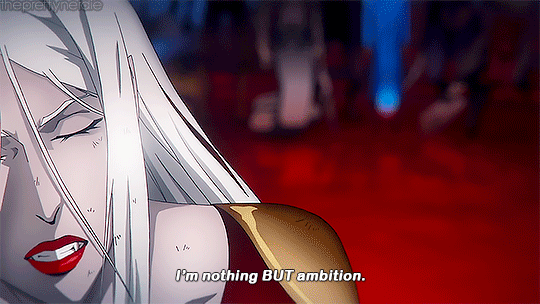
This is Carmilla from the popular Netflix show "Castlevania", and if you've payed attention to my previous points, it should be pretty obvious what her character represents and how her story ends.
Note that she is also an abuse and rape survivor who is represented as evil and cruel for being angry at what was done to her.
To top it off, she is also an example of the man hating woman stereotype, whose anger at the misogyny and sexism of the world is portrayed as an "overreaction" and as "too much".

At the end of the story, she had to be taken down by another man (Isaac) so that the status quo could be preserved, and the reign of a crazy bitch like her could be stopped. Horay, the day is saved from yet another unstable, selfish woman who would have brought suffering and pain over her country if allowed to rule. Hysterical women with their demand for equality.
Conclusion:
In all these examples, we can see female abuse victims thriving for power and status, for respect, being represented as something negative and something to avoid. Trying to fundamentally change a system that is rigged against women/female representing people is a fruitless endevour that will eventually fail and drive us crazy, because our minds aren't strong enough to handle this type of responsibility and status.
Holding on to anger and bitterness over what was done to us is the sign of a bad person, and the only morally acceptable path is to forgive/ignore our abusers and let the injustice continue to happen.
Strangely enough though, that same gaslighting, victim blaming mentality gets almost never applied to male characters. Men who seek vengeance are never portrayed as weak or crazy for giving in to the wish of changing a corrupt system/killing bad people. (Batman, the Punisher, Hawkeye, John Wick, Jason Todd, Erin, Scar from FMAB, Iron Man, and so on)
The reason why these stereotypes almost never apply to men but almost always to women is sexism. There is no other explanation for this. These tropes were specifically designed to make society believe that women aren't cut out for leadership positions and are happiest with domestic, easy tasks like watching after our children and taking care of the household.
Women who are angry, women who are dominant are to be feared and distrusted. They are represented as a danger to the general public and need to be taken down before they enact their evil plans.
Feel free to add further examples.
#got#game of thrones#daenerys targeryan#merlin#morgana pendragon#castlevania#carmilla castlevania#carmilla karnstein#trevor belmont#atla#azula#atla azula#zuko#uncle iroh#katara#john snow#I was thinking of adding sylvanas windrunner#but her story isn't finished yet#though I think we all know that Blizzard is a misogynistic piece of shit whose creative team are sleazy scumbags to women#sexism#misogynistic#tw abuse#abuse#tw rape#rape#victim blaming#gaslighting#tw blood#tw death#vampires
65 notes
·
View notes
Text
Keeper of Mine: The Good, the Bad, the Basics
I rly like this game but there’s like no hype for it so I’m gonna fill the void by shoving it in y’all’s faces. Deal.
SO. MC is an accountant and home baker - she’s quite accomplished in both of these fields, but other than that she’s unremarkable. Until. She’s transported into the canon of her favorite visual novel, “From Hostage to Empress.” Suddenly this working-class orphan finds herself with a doting father, a duchy, and more money than she could ever spend in a lifetime. One problem, though: she’s the villainess of the novel, slated to die at the end.
Thinking the entire situation is a dream, MC behaves recklessly, accidentally altering the plot of the novel. She only meant to change the endgame couple and see her ship come true, but now things are spiraling out of control and with war on the horizon, supernatural violence within the nation’s borders, and burning questions coming to light abut who the real big bad is, the villainess becomes the unexpected hero of the story.

There are four main love interests: (left to right) Ain, Ray, Kant and Hugh.
Ain is the gentle and sensitive aristocrat who in MC has finally found something to raise his voice for. Ain seems to be the canon love interest, so a handful of his diamond scenes are free, as opposed to the other three characters charging the player. Despite that, he never feels forced onto the player, unlike SOME games I could mention, IAN.
Ray is crown prince of the Haaliskarde Empire, and MC’s on-again-off-again fiancé. Abrasive and temperamental with a soft side, he’s fed up with the villainess’s behavior and is thrown for a loop with MC’s sudden takeover and the resulting change in personality. He hopes that she might have reverted back to the girl he once loved.
Kant is the most skilled knight in the Empire, believing that his only purpose in life is to die for his nation. His loyalty is unshakable, but when the woman he’s in love with makes herself an enemy of the Emperor, he has to decide which treason will be easier to stomach. Kant seems to be the fan favorite, and it’s no real wonder.
Hugh, like Kant, is a commoner, but he’s got the money to match the elite, since his father controls the black market. He’s the designated best friend character, and he and MC continue to stick together and solve problems after they wind up kickstarting the main conflict via a brief misadventure. He’s my personal favorite, and his diamond scenes are comedy gold. But there’s another important member of the main cast...

Princess Marie, the original main character of the visual novel “From Hostage to Empress.” Despite her wide-eyed appearance, she’s a force to be reckoned with - a proud and powerful mage willing to fight for what she wants, and what she wants is MC. The best part, she’s a love interest too! Hers is a secret ending, but it’s not particularly difficult to unlock.
The Good:
So there’s a female LI. But how is the romance treated as opposed to the m/f couples? As it turns out, just the same! Nobody in the story thinks that a romance between two men or two women is particularly odd - it’s not shied away from, and it’s not made into a big deal either. it just is, and that’s lovely.
MC is absolutely delightful. She’s not your typical clueless isekai heroine, she knows this story like the back of her hand and in the beginning, effortlessly fools other characters out of suspecting anything is off about her. She’s not helpless either, at multiple points in the story she picks up a weapon (or the closest thing to one) and fights. She makes some bad decisions, but they’re reasonable mistakes given the circumstances - if I thought I were sentenced to die, I would also probably curse out the person responsible, just as a last act of spite. The skills she’s accumulated in her world turn out to be relevant to the novel, and she takes full advantage of that.
The family bonding makes me feel things. In her world, MC is an orphan, and was raised in a group home. She put herself through school with no support, emotional or financial. In the novel, however, her father is a loving man who will do everything in his power to protect her from her enemies. At one point he kicks the Emperor out of his and MC’s manor because he doesn’t like the rude tone the prince is taking with MC. When will your fictional father ever.
The Bad:
This is pretty much just going to be content warnings. There is an attempted r*pe shortly after Marie is introduced. Sadly, it’s a plot point and cannot be skipped past the first time you play the episode. The attacker does not succeed - MC and Marie fight back and hold him at bay until he’s caught in the act - and is promptly slammed with severe consequences, but the scene still exists. It is never mentioned again.
There are a handful of throwaway comments where MC threatens to hit an LI for acting shady. Granted, it’s treated as a joke between friends, but I personally didn’t care for it, so if you have a strong reaction to that kind of thing, be warned.
The treatment of mental illness. Holy hell is it awful, at least in the novel. The entire reason the villainess was - well, villainized, is because she’s psychotic. Literally. She showed severe symptoms of psychosis and instead of trying to treat her, other characters in the original canon wrote her off and had her executed. MC points out early in the story how fucked up their attitude towards mental health is, but people continue to call her crazy and spready rumors of her madness coming and going. Even MC leans into it at one point when she’s trying to get the novel back to its original plot by behaving like the villainess.
Anyways play this game I’m starved for fandom 🥺👉👈
27 notes
·
View notes
Text
Open Book
read it on the AO3 at https://ift.tt/2YmetfD
by Anonymous
"I can't tonight, though." Gary flips the waffle iron over.
Sheila gets a new mug and pours herself some more coffee from the pot. "New episode of Game of Thrones or something?"
"No, but I wish," Gary says. "It's just that I've got a date."
The Monarch chokes on a bite of waffle. Sheila thumps him on the back, helping him cough it up.
"WHAT?"
Words: 2511, Chapters: 1/?, Language: English
Fandoms: The Venture Bros
Rating: Mature
Warnings: No Archive Warnings Apply
Categories: F/M
Characters: Henchman 21, The Monarch (Venture Bros.), Dr. Girlfriend, Original Female Character(s) of Color, Assorted villains - Character, Team Venture, the ghost of 24 - Character
Relationships: Dr. Girlfriend/The Monarch, Henchman 21/Original Female Character(s)
Additional Tags: Canon-Typical Behavior and Language, this is a romance between two unrepentant nerds and their love for cheesy media, maniacal laughter, Season/Series 07, i might add more chapters if theres enough response, i like gary he deserves luv
read it on the AO3 at https://ift.tt/2YmetfD
4 notes
·
View notes
Text
And dude, I am not above that petty shit. I absolutely know I’ve been petty about villain/heroine ships that I thought were lame or poorly executed or just icky in general. That said, I did so typically when I knew that thing that annoyed me wasn’t being questioned at all by the majority of people.
When it becomes a fad to hate on it, then the tone starts to change. Suddenly people who are outside villain/heroine fandoms are joining in, and the butt of the joke is All Of Us. Or the inferior person being made fun of is Any Fangirls At All. Suddenly MEN are targeting fangirls. Suddenly there are people who are morally inferior or stupid or shameful.
This is a reminder than men NEVER EVER EVER have to justify or explain themselves when they think a villainous or evil female character is hot or would be appealing in a relationship with their favorite heroes. They are NEVER beholden to popular opinion, They are NEVER made to feel inferior for what excites them. You are not a better feminist for asking women to justify something that is unquestioned when men enjoy it.
Catwoman may exist and have sexual/romantic tension with Batman, she may play up kink in the subtext of her behavior regardless of how that compares to real-world safety practices, and nobody questions that. Nobody cares.
13 notes
·
View notes
Text
Voltron: Legendary Defender—an Unfulfilling Copy of Award-Winning Mecha Predecessor and Market Competitor, Transformers Prime?
Note, this comparison post has major spoilers for both Transformers Prime and Voltron: Legendary Defender. It contains screenshots/topics from the shows that some may find sensitive or disturbing.
The Transformers franchise and Voltron franchise have been direct market competitors, in toy sales and in (primarily boy-targeted) cartoons, since 1984. Both franchises have various iterations and reboots spanning decades. But in June 2011, Voltron: Force aired and stumbled. It was cancelled after a single season and achieved zero awards. In comparison, the competing Transformers franchise had aired Transformers Prime in November 2010, and the cartoon gained immediate critical acclaim, winning over older fans of highly successful previous Transformers cartoons—and pushing the content limits of the (US-rated) Y7-FV mecha genre.
By the time Transformers Prime (TFP) ended in 2013, it had earned several awards and set high standards for mecha cartoon shows in regards to animation, directing, plot complexities, and moral ambiguity, with a very extensive budget per episode.
This 2010-2013 show ultimately wasn’t your average kids show. Executive Producers Robert Orci and Alex Kurtzman admitted to using this show as their way to deepen the characters they fell in love with from writing the PG-13 live-action film, Revenge of the Fallen.
But did the show tone down its PG-13 origins? Not by much, if at all. TFP deals with very dark, edgy content, as well as sophisticated introspection into various characters. And it got away with it, in part, because it handled controversial topics so well.
Transformers Prime, under a TV-Y7-FV rating, boasts:
Multiple instances of major character death (even within episode 1, complete with blood splatters)
Graphic body horror and mutilation
Zombies
Physical and mental/emotional abuse
Electrocution, near-death experiences with major health consequences, betrayals, and torture
Amputation, disabilities, and characters actively experiencing PTSD and having mental breakdowns
Horror-genre monster chase scenes
Major trolley problems and moral ambiguity
War crimes
Good guys doing questionable/bad things, bad guys doing good things, and good guys working with mass murderers to defeat a common enemy
To an extent, transformers themselves do not exhibit a fully human image, which decreases the possible emotional reaction one might have to the graphic content. At the same time, this show dropped its money hard on developing the characters and making them as “human” as possible, and even having the human characters struggle with that realization, which resulted in a suspenseful, emotionally invested viewing.
The show still, to this day, enjoys an involved and productive fandom who delight in its characterizations, its plot, and its core message (which executive producer Jeff Kline explained as “the universal need to find or forge a family and a home”).
But why does Transformers Prime matter to today’s children mecha show environment? And why does it specifically matter to the audience who watched Voltron: Legendary Defender?
Executive Producers for VLD, JDS and LM, were still working on Legend of Korra, which ended in 2014, when they pitched a reboot for Voltron only months after TFP had finished in late 2013.
Hilariously, a lot of what happens in VLD had already happened in Transformers Prime, but with the twist of following through on a positive or morally meaningful message. So if you’re looking for a show that does what VLD did, but did it well—check out Transformers Prime. This show accomplishes:
Powerful female-gendered characters who live to enjoy their heroism and achieve their dreams
Individuals overcoming their PTSD and reintegrating socially
Humans not being the center of the universe and actually learning moral lessons
Multidimensional, dynamic villains, antagonists, and self-aware heroes
Abuse victims and villains breaking the cycle of evil
Deceased warriors being consistently remembered for their sacrifice and value
Socially and physically nonconforming individuals rising to great moral fame and recognition
A powerful character dying for the greater good, in which they transform into something even more powerful
Heroes being held to high moral standards
Still not sure about checking out TFP? Then enjoy this list of the vast extent to which VLD mimics TFP, as well as how TFP handles such topics with increased complexity and finesse compared to VLD:
Updates to Worldbuilding and Backstories
TFP, in keeping with live-action films, boasts aged-up human companions compared to previous transformer cartoons (Sari from TFA was only 9 at the start of the show). Transformers has, time and again, more typically aligned itself with bildungsroman (coming of age) storylines. Not surprisingly, VLD followed suit in adjusting its pilots to more strongly align to the teenager age group. For the Voltron franchise, however, this meant de-aging the pilots, which made them more fallible in a franchise where they were traditionally the center point of morality as adults. This is unlike the young humans in TFP, who are traditionally schooled by or in dialogue with the transformers about moral decisions and the hardships of growing up/becoming more responsible.
TFP’s synthetic energon or Synth-En, drives people crazy similar to VLD’s quintessence overexposure, bringing out the worst in them. Dark energon, which glows purple and is a mystical science-magic, is derived from a source of great chaos and lends disturbing powers, including reanimation of the dead and mind control, to one willing to bond with it. This is similar to quintessence manipulation as well.
The war between Decepticons and Autobots ultimately resulted in the destruction of their planet. Similarly, for the first time ever in Voltron history, both Daibazaal and Altea are destroyed in the war, leaving both people groups (or their remaining warriors) homeless and roaming the galaxy in guerilla warfare.
TFP boasts characters who live through incredible spans of time. VLD, for the first time in Voltron history, expands with a world of basically immortal aliens as well.
Updates to Characters
VLD also majorly expanded or revised previous Voltron lore, characters, and character arcs. In doing so, it brought Voltron characters closer than ever to their Transformer counterparts in TFP:
(A quick list of characters discussed, for reference if you need it)
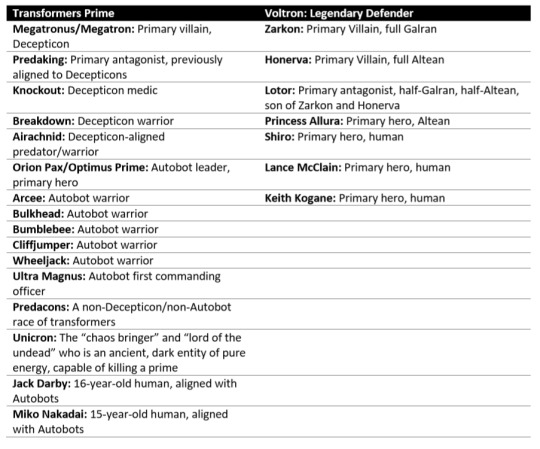
Honerva copies Megatron, both before and after his corruption. Honerva’s new history was entirely unprecedented within Voltron lore, but it was a core staple within TFP.
Both Honerva and Megatronus start off as good people, with very close friendships with the protagonist leaders, Alfor and Orion Pax. Both Megatronus and Honerva see societal ills, inequality, and want to fix them, challenging the traditions/hoarding of power by those of higher authority. Both Megatronus and Honerva are told their ideas for improving the world are wrong because they involve force and a demand for access to great power (For Honerva, it’s the quintessence field. For Megatronus, it’s the powerful Matrix of Leadership, which would result in making him a prime). Both characters ignore the concerns of Alfor/The High Council and grow increasingly more frustrated with the balance of power, desiring to usurp it for themselves. Both suffer the consequences and jumpstart a millennia-long war.
Their names change upon corruption. Megatronus becomes Megatron. Honerva becomes Haggar. Neither Megatronus nor Honerva are ever again able to truly separate from who they’ve become. The good part of them is permanently marred.
They’re both obsessed with a magic that can be used for great evil, from a questionable, destructive source (Dark Entity/rift creatures in VLD, the chaotic dark entity Unicron in TFP).
Both shows include an episode of the protagonists/heroes diving into the mind of Honerva/Megatron for more information, and having a harrowing experience in doing so.
Both Honerva and Megatron reanimate, to an extent, a dead soldier (Lotor/Cliffjumper) and use his body/weapons for their own purpose.
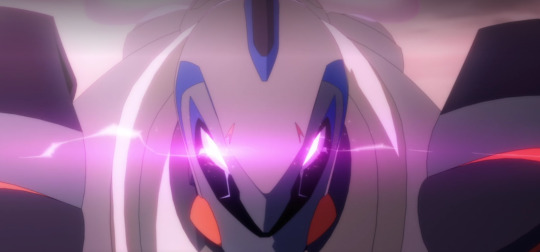
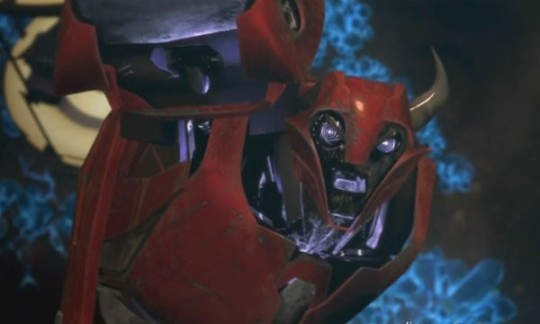
Honerva and Predacons Rising Megatron
In the final movie that ended TFP, Predacons Rising, Megatron’s character gets taken to a whole new level. Honerva’s arc eerily matches:
Both Honerva and Megatron are overwhelmed when the Dark Entities/Rift Creatures and Unicorn decide to destroy the world(s) most precious to them.
Both die and are reanimated back to life by dark power.
Upon reanimation, both can wield purple magic.
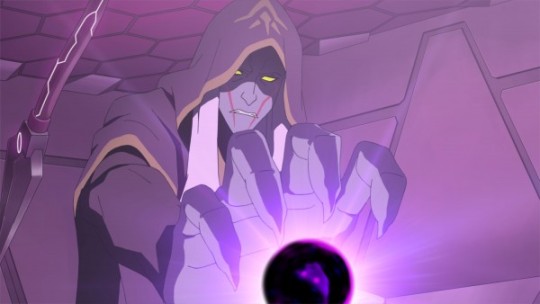
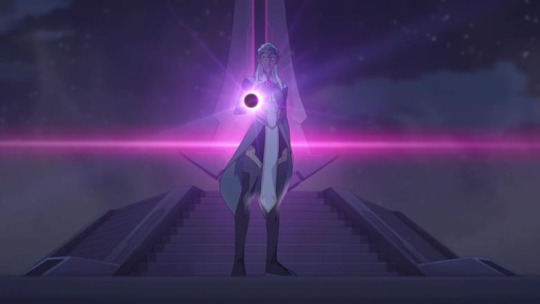
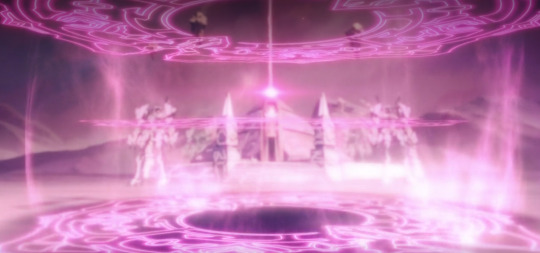
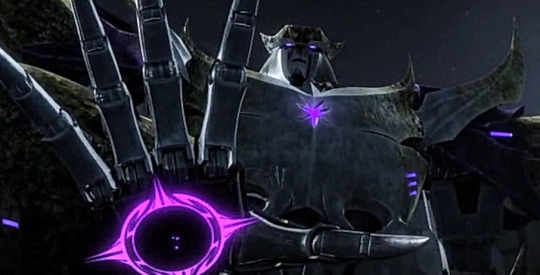
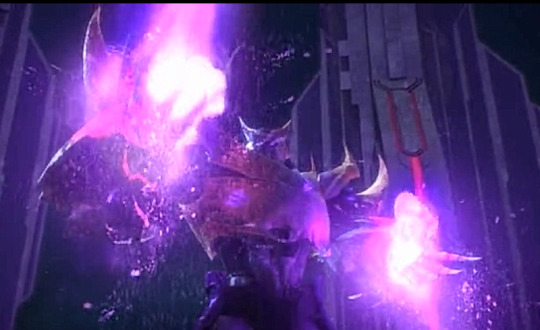
In TFP, Unicron, an ancient dark entity who is the source of all chaos and evil, says, “Your husk will simply be an instrument of my will.” Megatron undergoes a painful transformation that alters his usual form. In VLD, through contact with a dark entity and through the corruption from pure quintessence exposure, Honerva becomes Haggar. She is heavily altered visually, and is little more than a puppet of Zarkon’s will until she remembers who she is and fights back to regain herself, just as Megatronus does with Unicron.
They both gain the ability to peer into the minds and even alter the minds and behaviors of others.
Megatron cannot join the Allspark (go to the afterlife) because he’d been joined to the lifeblood of the chaotic Unicron, and he spends a deal of time cursed inside the mind of Unicron. Honerva’s soul does not move to the afterlife in death, but instead, being infused with quintessence, she is reanimated. They’re both the immortally undead. In addition, Honerva had “cursed” the souls of the OG paladins. They were inside her mind with her, unable to be in the afterlife because of it, similar to the plight Megatron finds himself in within Unicron’s mind.
They both give themselves over to scorched-earth policy. Honerva refuses the title to run an empire and goes on to nearly destroy the multiverse. Megatron, as Unicron’s puppet, admits to fellow Decepticons (who are subsequently disturbed by him), “I do not wish to conquer this world—I wish to eradicate it.” Honerva follows suit in her desire to achieve the past at any cost to the future of an entire multiverse, carrying Megatron’s banner that, “The past shall consume the future!”
A quasi-redemption arc: Both Megatron and Honerva achieve what they want. Megatron gets bonded to the spark of a great, chaotic power, able to warp time and space as a new, all-powerful being. His abilities allow him to quickly fly to a regenerated version of his home world, Cybertron, which had been destroyed millennia ago. Honerva gets access to Oriande, transreality materials, and achieves entry to a dimension with a still-living family on her home world of Altea (which was living, unlike the Altea she know, which had been destroyed millennia ago).
Once they’re given over to the power or end they desired, they do not achieve the true effect they wanted. They have a moment where they lose their own personal agency within that situation, only to rage to destroy everything at great risk to themselves, and then from out of the rage, fall into a daze of distaste for what their desires have brought them.
Then they both act defeated, whiny, and salty over how nothing’s like what they wanted.
They both disappear off into the sunset in a disquieted, defeated sense of, “Whatever, I guess I’ll be good now and do my own thing because I’m tired.” (Paraphrasing here.)
In TFP, the insanity of Predacons Rising Megatron is described by Predaking (another character) as, “Dark magic…perpetrated by the demon who lives in Megatron’s skin.” In a similar manner, Lotor accuses the Oriande-infused Honerva of being “an abomination.”
Zarkon is a mirror to the standard, more well-known Megatron. But in VLD, he boasts similar characteristics, like Honerva, to Megatronus, picking up Megatronus’s gladiator history. Class issues are important to both Zarkon and Megatronus as well.
It’s implied that Megatron was born into a very low class and rose to power through the gladiatorial ring by rite of combat, bolstering his political career. As a gladiator “in the pits of Kaon,” his rise to become the leader of the Decepticons mirrors Voltron’s brand-new lore of Zarkon rising to imperial power through the Kral Zera, which is a ceremonial gladiatorial arena to establish the new leader through rite of combat.
Zarkon functioned as a military mentor for Alfor; Megatronus was a political mentor to Orion Pax.
According to the lore of the original Thirteen Primes, Megatronus Prime got into a fight with his brethren that resulted in the death of his lover, Solus Prime, a weapons forger. Megatronus Prime’s title as “The Fallen” being closely related to in-fighting specifically over a lover in many ways echoes in the ultimate breakdown of friendship between Alfor and Zarkon, specifically over Honerva and her abilities to manipulate quintessence into tactical advantages/weapons. The end result is that Zarkon “falls” as well through Honerva’s death, just as Megatronus Prime falls through the death of Solus Prime.
Zarkon is massively injured and in a state of unconscious for a time, disrupting the empire. Megatron as well is massively injured in a state of unconsciousness for a time, disrupting the order of command for the Decepticons. In both instances, this is a major plot device to introduce other characters to the show and deepen political conflict.
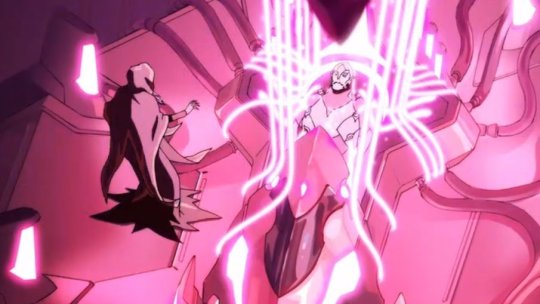
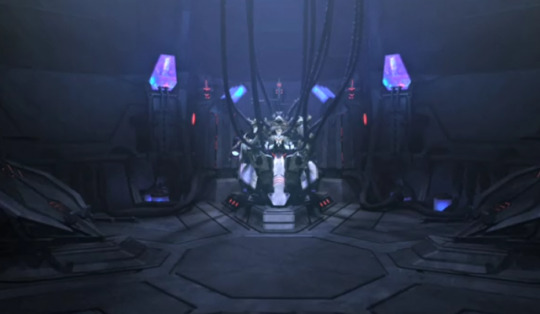
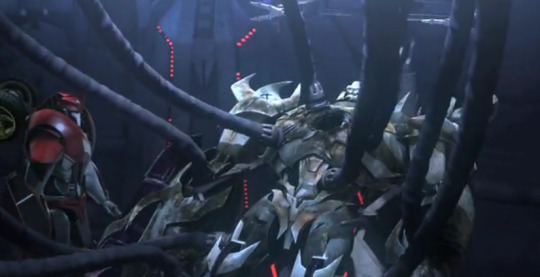
Zarkon’s armor and facial reconstruction for the reboot more closely mimic Megatron’s elongated face and eye-set, as well as his very wide-shoulder, spiky armor, complete with angled armor lining his cheeks. It’s similar enough that others have poked fun at their similarities.
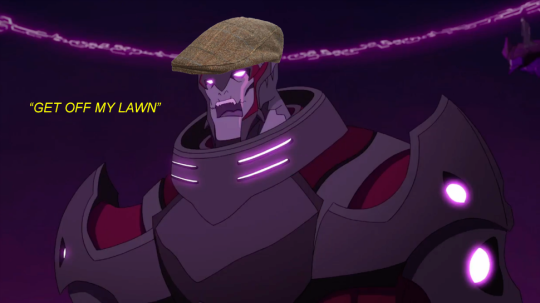
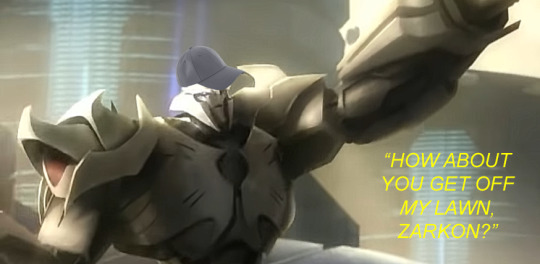
Alfor’s history more closely mimics that of Orion Pax. They’re both initially great friends with the very person who would later seek to kill them and their friends.
It’s implied that Megatronus suffered through the very issues that he was critiquing to the High Council. Meanwhile, Orion Pax was of a higher class and coddled from experiencing the same societal ills. In many ways, this echoes how Alfor critiqued the behaviors of Zarkon and Honerva, while standing from a place of incredible power through Oriande, as well as physical peace and comfort.
Alfor and Orion Pax are both very scholarly individuals without the military expertise as touted by their counterparts, Zarkon and Megatronus.
Alfor and Orion Pax are both initially deceived by the heartfelt words of their friends, only to realize in horror what their friends actually desired beneath it.
Orion Pax and Alfor stand as the ultimate inheritors of the powers and status coveted by Zarkon/Honerva and Megatronus.
When Orion Pax is converted to Optimus Prime, his old self somewhat dies, and he becomes a more perfected, all-powerful version. Alfor, likewise, dies in the war…and his legacy is inherited by Allura, who is canonically shown as even more powerful. She carries on the mantle/legacy as previously set before her by her predecessors.
And last but not least of the Big Four, Princess Allura’s arc in VLD very closely mimics Optimus Prime’s arc in TFP.
Like Optimus Prime, Allura becomes locked into a millennia-old war that she did not start herself.
Optimus Prime is the last of the primes. Princess Allura is the last of the royal Altean line. Both primes and royal Alteans have access to deep knowledge and mystical abilities coveted greatly by others of their race.
The High Council bestows the Matrix of Leadership, which is the core of Optimus Prime’s power. The Ancient Alteans of Oriande impart their wisdom and knowledge to enhance Allura’s power. Megatronus’s failure to achieve the Matrix, receiving only rejection in return, is echoed in Lotor’s rejection and fall in Oriande, who like his father sought to obtain such power through Galra-standard force.
Optimus Prime is a member of an endangered species, believing his few Autobot comrades to be some of the only ones remaining after the great war. In a similar way, Princess Allura struggles with the isolation and fall of Alteans. Both Optimus and Allura are separated by vast distances of space from other possible survivors of their own kind.
They both agree to truces with great enemies and unknown powers for a specific end. Allura accepts the dark entity and works alongside Lotor. Optimus makes several deals with Megatron, at great hesitance from his team.
Both wield great power that no one else currently can.
They both sacrifice their lives and own energy in the end to restore life itself to worlds, because they cannot separate themselves from the power it takes to restore life.
They both pass down a “transformation” to one of their brethren before dying. Princess Allura gives Altean marks to Lance. Optimus converts Bumblebee to a warrior.
Their comrades all stand and watch as they willingly sacrifice themselves, and they have first-row seats to a major visual outpouring of light and life.
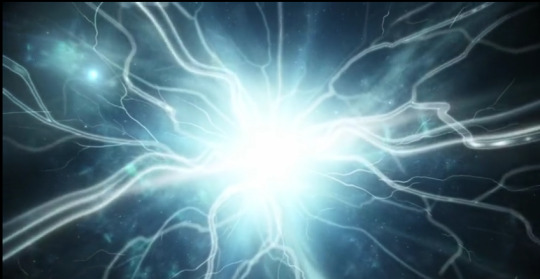
(Screenshot explanation: The visual effect of Princess Allura sacrificing herself to restore life to the multiverse.)
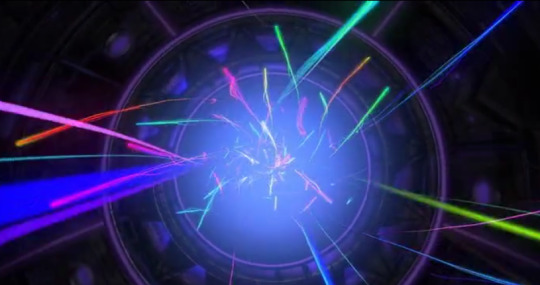
(Screenshot explanation: The visual effect of Optimus Prime sacrificing himself to restore life to the Well of All Sparks.)
Aside from The Big Four, there are other TFP characters with extreme similarities to VLD supporting characters.
Knockout/Breakdown/Predaking as Lotor
The Knockout connection to Lotor
According to Hasbro’s vice president of development and scripted entertainment, Mike Vogel, Knockout as a character received several upgrades because his previous iteration as “Lugnut” wasn’t considered sexy enough. Similarly, Lotor in VLD was upgraded to be a prettier bad boy in several ways that he hadn’t been before, especially in regard to physical clothing and behavior. Both pretty bad boys ultimately boasted a tight waist, spiky shoulders, great eyeliner, and heavily angled paneling on their torsos:
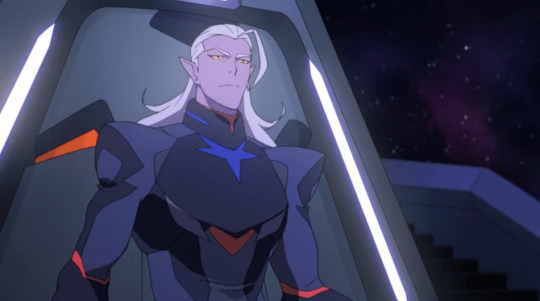
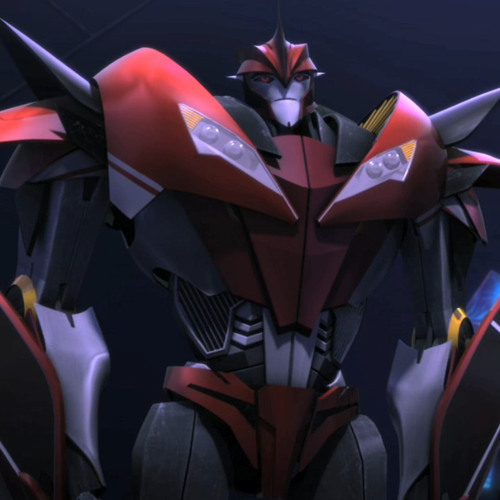
Knockout is coded as being “different” than most of the other Decepticons and is looked down upon for having a road-based alt-mode instead of an alt-mode that affords flight. In being so, he is more similar to the Autobots despite being born as a Decepticon. Likewise, VLD heavily increases the amount of attention and derision given to Lotor for being half-Galran and half-Altean. Both Knockout and Lotor profess great confidence and satisfaction in what they are, though, regardless of anyone else’s critique.
Knockout is summoned to Earth after the fall of Megatron, who remains in an ill, unconscious state. This is reflected in how Lotor is introduced into the revised Voltron series, to assist his reigning father in a time of need.
Knockout is a medic and is tasked with preserving life—or taking it out. Lotor’s base motivation is also to preserve life, but he maintains Knockout’s underhanded side of also deciding when to eliminate a loose or unproductive end.
Unlike previous iterations of Lotor, the VLD Lotor is excessively more evasive and less likely to barge in bull-headedly into battle. Knockout uses similar tactics.
Knockout gets melded into a ship (although unlike Lotor, he does get out and isn’t dead).
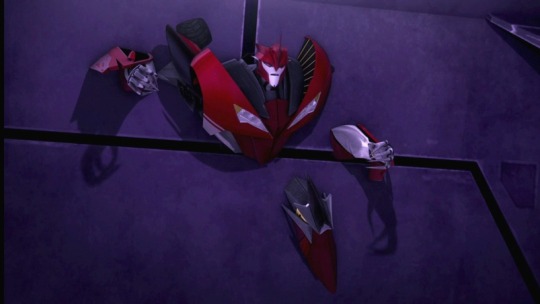
Knockout constantly schemes for more power and prestige, using underhanded tactics. He has very little loyalty but does have a deep bond with fellow Decepticon Breakdown, who functions as the muscle to Knockout’s intelligence. They’re usually seen together as two halves of the same brotherly unit. In a similar way, Lotor is the scheming commander and point of intelligence in his own small group. His generals are overall the brawn, like Breakdown.
Knockout provides confidential information about his old Decepticon comrades to help the Autobots while in custody as a prisoner of war. (Although unlike Lotor, Knockout demands, “We’re prisoners of war; we have rights!”)
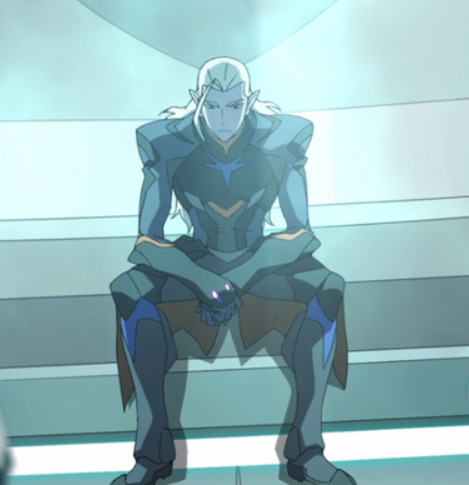
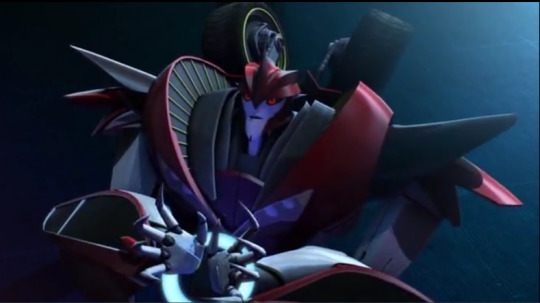
The Predaking connection to Lotor
Predaking is a type of Predacon, an ancient beast that died long ago but is brought back to life through experimentation. In ways, his ancient status and the strange circumstances of his “birth” echo in the way Prince Lotor is a vestige himself from ancient times and was still growing in Honerva when she died, suggesting that he died as well or was somehow preserved by his infusion with quintessence. The result is that his life is unnaturally sustained by quintessence itself, when he would have otherwise been dead. Similarly, Predaking’s existence was not possible without intentionally overriding natural limitations, since his kind could not be “sparked” naturally.
Predaking is groomed to be a weapon for Megatron and initially assumed to be a dumb beast. In doing so, he endures ongoing physical and mental abuse by the Decepticons, particularly Megatron’s second in command, Starscream. As he grows more intelligent and powerful, he increasingly balks against the treatment he receives and loses loyalty to Megatron. This is similar to Lotor being groomed as the heir to the Galran throne via brainwashing but yet suffers abuse for what he is. He, like Predaking, ultimately grows to reject much of what he’s been told to believe about himself and his place in the world. Both Lotor and Predaking are strong enough to challenge and nearly defeat the main heroes of the shows, Voltron and Optimus Prime, respectively.
Predaking, in hatred for Megatron who tried to make him a weapon, attacks him with the intent to kill. Lotor, likewise, attacks his father, Zarkon—although Lotor does achieve killing him.
Both Predaking and Lotor are core to the dismantling of various alliances upon the discovery of a colony of innocents being killed in the name of tactical war advantages. In both cases, the innocents were people in tubes being groomed/harvested for war purposes.
The Breakdown connection to Lotor
Decepticon Breakdown is betrayed by one of his own team members, whom he had found attractive and had flirted with. The Decepticon femme Airachnid kills him. The distorted remains of his body end up being used for spare parts for a terrorist’s horrifying fusion of organic flesh and mech technology. Ultimately, Breakdown’s body is a victim of being used post-mortem to further the military aims of another person who wanted to exploit him. Breakdown’s personal agency is completely removed, and his body receives no rest.
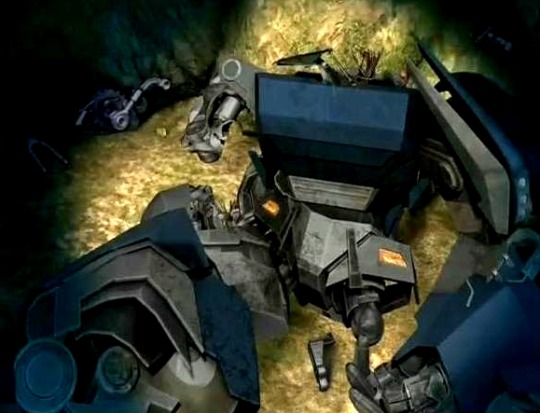
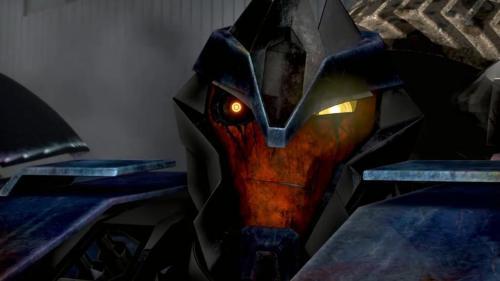
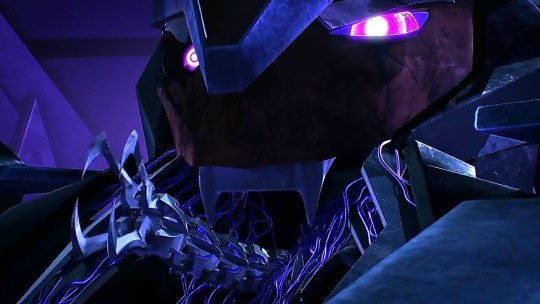
Lotor, likewise, is betrayed by Voltron and specifically by Princess Allura during an alliance. Princess Allura, as his love interest, kills him. The distorted remains of his body, which are fused to the Sincline ship, end up being used post-mortem to further the military aims of Honerva. Lotor’s personal agency is completely removed, and his body receives no rest.
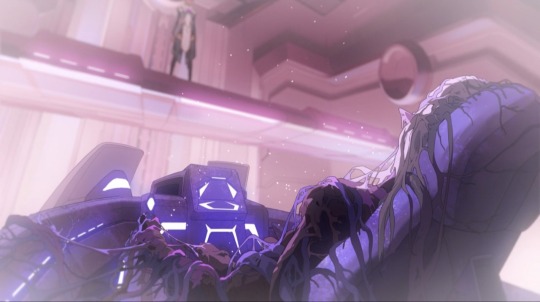
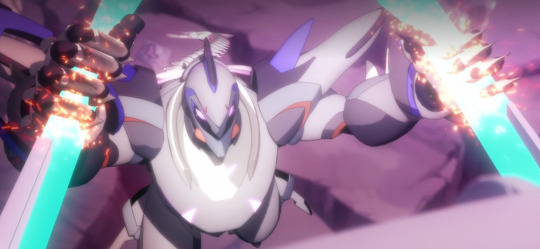

Bumblebee as Lance
Bumblebee and Lance, as the beloved young but inexperienced warriors, are both killed and brought back to life.
Bumblebee has progressively taken over as the frontrunner of the show within the Transformers franchise. Likewise, Lance gained more screen time and heightened significance in VLD compared to previous Voltron iterations.
Lance in the VLD finale and Bumblebee in the TFP sequel both struggle with the dissonance between who they were during war and now who they are as guardians or people look up to, but who are somewhat vestiges of the past.
Optimus Prime, prior to his death, changes Bumblebee from a scout to a warrior, which was not what Bumblebee was originally designed to be. Princess Allura, prior to her death, alters Lance from being purely human to exhibiting Altean characteristics.
Arcee as Shiro
They both suffer from PTSD, having been tortured by the enemy, interrogated, and experimented on. Arcee, being mechanical, has had her visible scars repaired, but the nightmares remain. Shiro similarly experiences PTSD.
They both have lost a significant other to war. They’re both afraid of losing the children they’re responsible for.
They both find family and are able to find happiness by the end, putting to rest any conflict they had over their previous partner.
Nemesis Prime (a Clone of Optimus Prime) as Kuron (a Clone of Shiro)
Nemesis Prime is a “clone” of Optimus Prime, developed by the human terrorist group M.E.C.H. He exhibits a physical appearance similar to Optimus Prime but, when activated, carries out their will of death and destruction.
Similarly, Kuron is a clone of Shiro developed by Haggar. He exhibits a physical appearance similar to the true Shiro, but when activated, carries out Haggar’s will of death and destruction.
The reputation of Optimus and Shiro are temporarily called in question before others realize what’s actually happening.
Jack Darby as Keith Kogane
Both have missing/dead fathers. Their mothers are alive, and they’re very close to their mothers, but said mother is often not a part of their daily life, given her own missions.
Both are loners and go through an arc of no longer wanting to be a part of the team, during which the team has to remind them of what they’ve gained and how important they are.
Both have a high sensibility to wanting to do the right thing, but not feeling worthy or wanting to have a position of power.
Both are constantly annoyed by the bull-headed antics of their teammate (Miko/Lance), often rolling eyes or getting on their case, but end up bonding with them in the end.
Both are the “human” lead for their team.
Both inherit great power. Optimus Prime, when no longer able to complete the mission, hands Jack the Omega Lock key. When Shiro is no longer able to be Black Paladin, Voltron chooses Keith to carry it forward.
And there’s so many other character similarities.
Moral Ambiguities
VLD also copies the moral ambiguity standards set within Transformers Prime.
In an Afterbuzz interview at the 12:52 mark, JDS and LM uplifted VLD as fairly groundbreaking for children’s shows, per its moral ambiguities. JDS said, “The finale is almost, I don’t know—I don’t wanna say unlike anything that you would see in other like-minded shows, like let’s say, like, Transformers or Power Rangers, or….something that Voltron was like, by outward appearances, being compared to. But it was something I think really exciting for us to explore because we did create villains and create heroes that worked within this very kind of, like, shades of gray spectrum. There was black, there was white. But we played in this weird morally ambiguous zone a lot of the time. And that was—I think, it was important for audiences of every age group to see that.”
Lauren Montgomery agreed at 13:33, stating, “We also came from working on shows like Avatar the last Airbender, and Korra, which very much pushed those boundaries as well, and were extremely ground-breaking for children’s programming. And it was not something that was coming out of western animation.”
Afterbuzz Interview: https://www.youtube.com/watch?v=MudCcj6QRzA
However, the vast majority of what VLD did plot-wise with moral ambiguity was already used inside TFP, a western animation cartoon airing well before Korra:
The Colony Problem
In TFP, Autobots Wheeljack and Ultra Magnus knowingly and willingly commit massacre against innocent beings. Predacons (a different race of transformers, based on ancient beasts) were being groomed in test tubes in Megatron’s facility for the purpose of becoming Decepticon warriors. In fear that Predacons would hurt humans, the Autobots choose to kill them all. This decision comes back to haunt them dearly, through Predaking’s discovery of the massacre.
Predaking, who is a Predacon himself, is an antagonist of incredible moral ambiguity. He expresses great frustration with both the Autobots and the Decepticons. He despises the abuse he endures from the Decepticons, despises Megatron for betraying his kind to the Autobots, and then despises the Autobots, who knowingly commit massacre against his own kind. His tactics and perspectives, as he refuses both sides of the war and fights to create his own space, result in him becoming an ultimate antagonist to both Autobots and Decepticons.
The Trolley problem as experienced by the Autobots (sacrificing some to save many), and the resulting political fallouts, are mirrored within VLD.
In VLD, Prince Lotor had faced a similar trolley problem as well, in which he was instrumental in how several innocent Alteans were sacrificed for an unknown military aim against the Galra. The slain Predacons and second-colony Alteans are both shown in tubes in an experimental lab, represented as victims/cannon fodder of a much larger military function.
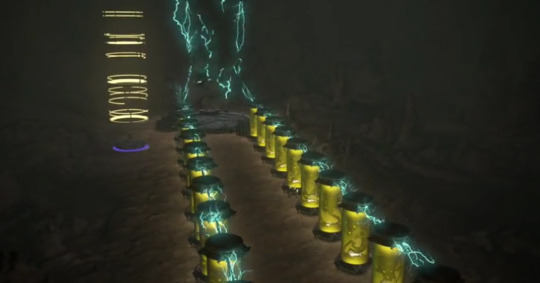
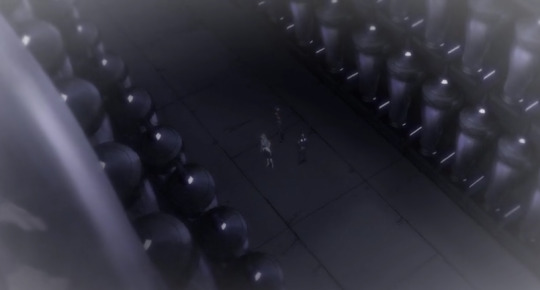
In VLD, the discovery of the Altean colony results in an utter destruction of previous alliances. Similarly, Predaking breaks ties with everyone in total disillusionment and rage, never again believing Autobots when they say they believe in peaceful coexistence of two races. His sentiments are echoed into VLD, in which the Galra are suspicious of Voltron and call them traitors.
Moral Shades of Gray: Characters Who Fall on a Spectrum
TFP’s Predaking has his own code of honor and is a primary example of a morally ambiguous character. He absolutely despises the Unicron-reborn version of Megatron. He snarls, “Dark magic…perpetrated by the demon who lives in Megatron’s skin.” This implies that Predaking ranks himself higher in his ways than Megatron. But Predaking, in his desire for revenge and power, also falls short of the stated moral standards of the Autobots. Similarly, Lotor absolutely despises the witch Haggar/Honerva, calling her an “abomination,” and yet he fails to meet the moral standards of Voltron and is therefore named an enemy despite their alliance.
Moral Focal Points: Have the Good Guys Always Been Good? And Have the Bad Guys Always Been Bad?
In TFP, the Autobots are said to have been the moral standard. However, they also bear a dark history of class issues / inequality and political corruption.
Similarly, in VLD, Alteans posit themselves as the moral and diplomatic standard, desiring peace for all. However, the Ancient Alteans hoarded Oriande’s power for only a select few of their kind. Alfor had no problems barreling in and using force against other people groups, in s3 flashbacks. He also created the most powerful weapon in the universe to enforce his version of peace, in which Voltron itself feeds off the life force of its paladins. Alteans additionally were able to terraform entire planets, the technology of which would have required immense power (where did they harvest that from?), and the result was the massacre of all life on said planet, for them to use to their will. These canon details suggest the Galra’s “komar” life-harvesting technology may have originated from Alteans themselves.
In VLD, the Galra (through Commander Lahn) express frustrations with Princess Allura’s coddled mindset, which mimics Megatron’s own frustrations with Autobot morality, which is derived from a position of power and comfort.
So, in general, there’s a moral similarity between TFP and VLD, in which the “heroes” have these dark pasts and yet attempt to smooth it over, while the “villains” are victims of a much larger, oppressive order and are calling the heroes out for their hypocrisies and crimes, demanding access to the same power as they wield, or committing similar crimes as the heroes and suffering harder for it.
So given all these similarities, how in the world is TFP so much better than VLD, message-wise?
1. TFP actually understood moral ambiguity.
In TFP, Megatron disbands the Decepticons, tired of bloodshed, without turning to the Autobots or acknowledging their perspective as the morally correct one.
The humans in TFP are excessively fallible, just like their transformer counterparts. There is a human terrorist group, M.E.C.H, who paces both Autobots and Decepticons, desiring their technology to enforce their will upon the world. These humans commit great horrors against both sides of the war, resulting in difficult decisions, odd truces between the Autobots and Decepticons, and humans fighting other humans. In other words, humans are NOT the moral center of the universe.
Some Autobots have looser morals and less self-control than others, which grates against the sensibilities of the more morally sensitive and results in a lot of disagreement and problems.
TFP consistently reflects on lessons learned. The heroes admit when they are wrong or fail to achieve moral perfection in their actions. They have to struggle through those decisions, the consequences of those decisions, and are bolstered to do better, be better.
The villains are not simply obsessed with power and are also capable of having empathy and doing things outside of pointless destruction. Breakdown is pleasantly surprised when one of the humans asks, “How are you?” And Breakdown responds politely. He also expresses sympathy for the hard work and struggle of the vehicons, who are servant-class workers on the Decepticon ship, similar to Galran robots. Likewise, Knockout expresses a love of human zombie movies and going to drive-ins to watch them, along with appreciating human vehicle design and street racing.
TFP shows villains scared and in pain, with a tremendous range of emotion and dreams. This is way more complex than how the villainous Galra are shown in VLD, who are consistently on a war path.
The heroes are willing to side with the villains (who killed their own people) to defeat common foes. The tension and resulting conversations from those truces are hilariously more complex than VLD, in which Voltron refused to work with Emperor Lotor, who is implicated in killing Alteans in the larger war against Galra. Instead of pursuing the tactical advantage of an ongoing alliance, Voltron simply assassinates him without due process for his war crime, asserting Voltron as the only morally unfallible point in the universe.
TFP shows the human heroes learning when they’re fallible and trying to be better.
TFP actively struggles with how human children/teenagers are endangered by the war, even when the children themselves don’t understand the danger.
2. TFP does a lot of other things well.
TFP always maintains a perspective that the true battle between good and evil is not a physical one—but one fought within the heart. Per Optimus Prime, “As even Megatron has demonstrated on this day, every sentient being possesses the capacity for change.” This is vastly unlike VLD, which stumbles to handle the perspectives of Voltron antagonists or the belief that people can truly change.
Megatron endures the very suffering he’d inflicted on others and comes to the decision on his own to stop his violence and disband the Decepticons, also ending his own “stereotypical toxic masculinity” arc. This contrasts heavily with Honerva, who goes into the afterlife without an understanding of why she can’t be happy as she is, demanding happiness and a family after she’s caused so much pain even to that family, perpetuating her own “stereotypical toxic femininity” arc.
There is a significant difference in the sacrifice of Optimus Prime compared to the death of Princess Allura. Optimus Prime’s sacrifice was a major power move, as well as not unexpected, given Transformers’ history of killing him off. (Although back in his first death in 1986, this was a horrifying shock to children who looked up to Optimus as a father). But within the context of TFP, Optimus had undergone a low point in the story prior, only to be rebuilt stronger than ever and growing in power and confidence as the re-energized leader of the Autobots. He had everything to live for (family, friends, regenerated planet, power) when he chose to sacrifice himself for others. Additionally, he knew there was hope in choosing to sacrifice his material body to restart the Well of Sparks, so that life could be regenerated on his planet. Optimus Prime even contextualizes his death in terms of rebirth and hope. His last words to his friends are: “Above all, do not lament my absence, for in my spark, I know that this is not the end. But merely, a new beginning. Simply put…another transformation.” He flies into death, more powerful and revered than he had ever been. He has a peaceful expression on his face. All of these details are wildly different from VLD. Princess Allura, like Optimus Prime, hits a low point beginning in s6 when Voltron’s alliance with Emperor Lotor unravels. But unlike Optimus Prime, Princess Allura continues to be progressively stripped of identity, power, and personal agency, careening into utter despondency until she willingly kills herself, with nothing to live for. She constantly gives up her own personal power to others, increasingly isolates herself from others, grows more emotionally volatile, denies her own people, and sinks into the background as other characters determine her life and decisions. There is nothing personally identifying about her by the end, with even her crown and state of dress removed/replaced with the uniform of a basic human soldier. Sorrow for her value and death comes too late in the story, when she has already become the most expendable character. It’s of additional significance that no one in VLD tries to help Princess Allura by offering other ways to resurrect the multiverse. There are only some paltry sniffles and weak, “No, don’t” responses. This is a huge contrast to TFP, in which several characters immediately are incensed by the thought of losing Optimus Prime. They jump in with ideas for how to possibly save their beloved leader, willing to endure more personal hardship on his behalf. They express that they didn’t fight this hard to resurrect Cybertron, only to lose someone they cared about. Optimus Prime explains why their ideas would not work, but in doing so, reveals that he is already one with the All Spark (meaning, that his spark is already part of a mystical collection of souls with the capacity to be born/reborn, and that continuing to live, bonded to the All Spark, would be denying all other souls from experiencing life). It is his explanation that bolsters the necessity of his sacrifice and converts his final words from being a hollow comfort to a genuine conviction that this was not the end. That they would all someday meet again.
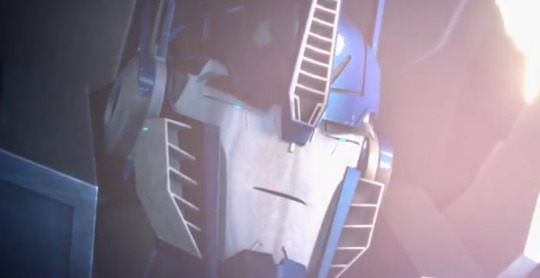
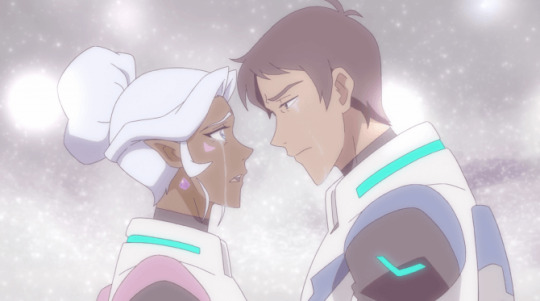
In the TFP sequel, Robots in Disguise (2015), it’s revealed that Optimus Prime, in death, has become an interdimensional being, capable of still interacting with and providing guidance to Bumblebee on the “human plane,” all while being spiritually tested by greater beings with even more interdimensional power than him (the Primes). Interestingly enough, this topic is mirrored within VLD. Such interdimensional beings are confirmed to exist via season 7, in which the Voltron paladins are whisked away by an all-powerful interdimensional entity, who tests their worthiness as warriors. Additionally, some of the VLD meta by @leakinghate posits that an afterlife existence for Princess Allura and Lotor as interdimensional beings was supposed to happen in the VLD finale, but was ultimately not published. Had such been published, Princess Allura’s final arc would have further matched Optimus Prime and better maintained the hope and meaning associated with his arc.

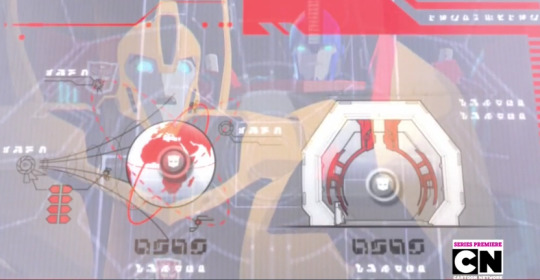
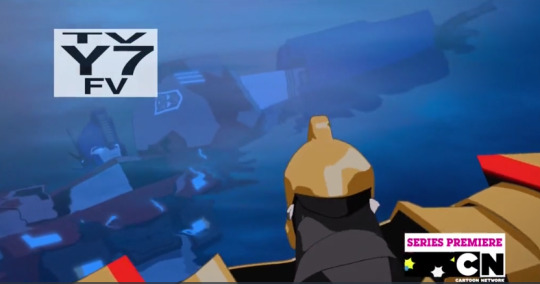
Transformers don’t always save the day. Sometimes, it’s a little human girl with a baseball bat, or a little human boy with coding skills, or a teenager willing to put themselves in harm’s way to protect them. This greatly humbles the Autobots, some of whom struggle with their pride and the reality that they don’t have all the answers all the time, and that sometimes, they need to be protected too.
TFP actively struggles with both positive and negative prejudices assigned to humans and transformers. The humans originally think the transformers are just robots without souls—they think it’s all a game. They soon discover that transformers can bleed, and have emotions, and have a soul than can die. Likewise, some transformers find the humans to be a nuisance and despise their “fleshiness,” but soon overcome those perspectives to grow very protective and attached to humans. In other words, everyone struggles through their own perspective and learns on the way.
Optimus Prime remains the consistent point of morality for TFP. When he does controversial things, like engaging in an alliance with Megatron or allowing medical aid to be provided to Decepticons, he acknowledges those things and explains his reasoning. This is unlike Voltron, who engages in action without reflection while still demanding a position as the unquestionable moral center of the universe.
Knockout, as the Lotor bad boy of the series, defects and actively becomes a member of the Autobots. He admits he didn’t have the best role models, and it’s shown throughout the show that he endures physical and mental abuse by some Decepticons as well. He makes a cameo in Robots in Disguise (2015), suggesting he is still alive and well as an Autobot. Optimus Prime at the end of TFP includes Knockout when he says each of his teammates had acted as a prime, offering a tremendous weight of value and respect to Knockout.
Even Predaking, the antagonist, ends up helping the Autobots when it counts and otherwise remains distant with them.
Predaking gets justice against his abusers.
Autobots and many Decepticons are consistently horrified and disturbed by the crimes perpetuated against Decepticon Breakdown, whose body is taken and mutilated by terrorist group M.E.C.H.
Arcee manages to positively cope with her PTSD and remains as an active, plot-intrinsic character to the end, with several episodes dedicated to her own character arcs and the advantages she provides the overall team. She lives to see and experience her dream of a restored planet come true, without being turned into an example of the sexy lamp trope.
The transformers are able to achieve their goal of restoring Cybertron and generating new life, which allows several other characters to begin healing from the trauma of war and regain what they had lost.
The humans who make villainous decisions have dire consequences.
The human Miko rises up to become an Autobot Wrecker in her own right, without sacrificing or compromising anything about who she is, how she presents herself, or what her other interests are.
Bulkhead originally despises Decepticons but ends up rescuing his own sworn enemy from torture and dismantlement because he learns to put justice for and the safety of all people first.
The number of parallels between Transformers Prime and Voltron: Legendary Defender extend even beyond this list. And yet as seen above, TFP succeeded in so many of the major areas where VLD ultimately failed.
Transformers Prime, even years after its finale, remains as the award-winning show that transformed dark and edgy content into messages of hope, redemption, gender equality and social acceptance, moral responsibility, the power of teamwork—and did it as a Y7-FV show geared primarily for young boys.
So, if you were disappointed in VLD and how it ended, check out the edgy but satisfying TFP for what a real children’s mecha show should be like.
(Special thanks to @mermaider00 for being my TFP buddy and for suggesting some of the points discussed in this post!)
#Voltron#vld#Voltron Legendary Defender#Transformers#Transformers Prime#tfp#s8 critical#meta#AN ADVERTISEMENT FOR TRANSFORMERS PRIME#Y'all need to watch this show#TFP was the VLD I had wanted all along and already had#I watched tfp when it first ran#then I had deja vu when I went back to rewatch after watching VLD#it's not a perfect show#still has flaws#the show even garnered a convention panel in 2015 about various production and show bible and budget issues#but it stands the test of time#i love transformers prime so much
51 notes
·
View notes
Text

Anon said - mun, why did you choose Katsuki to rp? What about his character intrigued you? Is there anything in common between you? // OOC Asks. // Always Accepting.

Well, i would and still am, more prone to rp female muses, the last male muse i had written, albeit for a short while, was Bayverse Donatello, it didn’t go very well, since the fandom went far too quiet, that was way back before Bnha became a thing.
But to be honest, i choose Bakugou, primarily to try another male muse and to me, of all those found in class 1-A, i felt like he was the easiest to start writing as, to give more depths and portray him much differently than Canon, also appearance wise, as this blog is mildly canon divergent & mostly anime oriented.
I was intrigued and a bit ticked off that most peoples, whenever he is on screen, are like ‘oh, this guy is toxic, he abused his friend, told him to die, etc’. Like, no one is perfect but myself, i don’t view this as abuse, i think Bakugou lost it because he felt like he got lied to, the moment Izuku was given the quirk of All Might. Even then, back to that childhood cutscene, at the river bank, Deku reaching for him, made Katsuki ticked off too, perhaps believing the other saw weakness, i don’t know how to properly explain that part.
That aside, i just want peoples to see that Bakugou is more than just a violent brat, which is why i differ from the typical Canon behaviors he shows. My portrayal is much more mellow and he’s on the road to better himself, personality wise but not a 100%, he’s still got that fire in him, prone to anger issues but is not afraid to learn over his mistakes, he understand weaknesses, because that’s how you grow, much like that manga panel, from the Remedial Arc.
But like, you do you, if anyone is to still hate on him, its fine, what isn’t, is to harrass writers, telling them how to write a muse, what not to write, etc. But know that, i for one, its hard for me to hate on fictional characters. Everybody deserve a chance, even someone like Bakugou and since the Kamino incident, he’s canonly mellowed down but that’s just me, personally.
As for what i share with the muse, i’d say i am also easy to anger, mostly if my computer is being a butt >-> and i have quite the potty mouth. At the same time, i’m not very fond of lying, unless neccessary, which apply to how blunt & honest my Bakugou is, he hates being told ‘oh, stop lying’, something like that, because i HC how he wouldn’t lie to allies and loved ones, only to villains who’s worth being lied to, getting tricked and so on.
Sorry for the long post but i really appreciate questions that makes me think. Thank you for sending this in, Anon.
#ooc#tw: long post#mun's opinions#i respect your choice to despise him but please respect that i do not think the same#mun does not equal the muse#this is always important to note#my muse is not perfect and he finally understood that#he even has self hate issues#moreso regarding his bestial side#ooc meta#character portrayal
2 notes
·
View notes
Text
Dear Chocolate Box Author
Hi! Thank you for writing for me! I’m reconditarmonia here and on AO3. I have anon messaging off, but mods should be able to contact me if you have any questions.
Dishonored | Fullmetal Alchemist | Machineries of Empire | The Penumbra Podcast | Simoun
General likes:
– Relationships that aren’t built on romance or attraction. They can be romantic or sexual as well, but my favorite ships are all ones where it would still be interesting or compelling if the romantic component never materialized.
– Loyalty kink! Trust, affectionate or loving use of titles, gestures of loyalty, replacing one’s situational or ethical judgment with someone else’s, risking oneself (physically or otherwise) for someone else, not doing so on their orders. Can be commander-subordinate or comrades-in-arms.
– Heists, or other stories where there’s a lot of planning and then we see how the plan goes.
– Femslash, complicated or intense relationships between women, and female-centric gen. Women doing “male” stuff (possibly while crossdressing).
– Stories whose emotional climax or resolution isn’t the sex scene, if there is one.
– Uniforms/costumes/clothing.
– Stories, history, and performance. What gets told and how, what doesn’t get told or written down, behavior in a society where everyone’s consuming media and aware of its tropes, how people create their personas and script their own lines.
Smut Likes: clothing, uniforms, sexual tension, breasts, manual sex, cunnilingus, grinding, informal d/s elements, intensity; stories whose resolution isn’t the sex scene.
A note: if we matched on an / ship, I generally don't require you to include a kiss, sex, or overt romantic language if you feel that you'd have to shoehorn it in. I'll trust that you wrote it with shippy intent.
General DNW: rape/dubcon, torture, other creative gore; unrequested AUs, including “same setting, different rules” AUs such as soulmates/soulbonds; PWP; food sex; embarrassment; focus on pregnancy; Christmas/Christian themes; focus on unrequested canon or non-canon ships.
—
Fandom: Dishonored
Ship(s): Delilah Copperspoon/Billie Lurk; Breanna Ashworth & Kirin Jindosh; Emily Kaldwin & Delilah Copperspoon
I find Delilah such a fantastic and fascinating villain, and I'd love to read more about her relationships with Billie or Emily. I’d love to know more about Billie’s time in Delilah’s gang - what does she see in Delilah, or Delilah in her, beyond using each other to get ahead, what do they want from each other? I imagine it might fascinate and please Delilah to have Billie’s submission and maybe even some level of trust - to do what? It'd be neat to read an AU of the end of KoD where Billie stays in Dunwall, whether she's won or lost against Daud - or even of the end of Brigmore Witches, if you want to AU Delilah's plot into something that doesn't put her into a child's body. Something addressing clothing (given the iconic costumes of both the Witches and the Whalers) and/or nudity? Something in the timeskip or DH2 timeframe? With regard to Emily, I'm specifically interested in adult Emily here - what happens if Emily doesn't escape at the beginning of DH2? (Or is captured at some point, I guess.) Delilah seems happy enough to keep her alive - does she make her a witch, want her in court as her niece? How does Emily feel about any of this as she learns about Delilah's past? Or, does Emily maintain a relationship with her aunt after the end of DH2, whether because there's a way to visit or communicate with her or in an AU where she's defeated differently and sticks around? How might Delilah's art fit into any of these scenarios? The differences in how they fight?
I would also love fic about Breanna and Jindosh's terrible friendship/working relationship. Is their distaste for everyone else enough to overcome their distaste for each other? Put them at a fancy party (Luca's or otherwise) kvetching about other people. Tell me more about the lead-up to the seance, or mutual projects where Breanna contributed more of the magic and Jindosh more of the science - or vice versa! Breanna's got a very scientific mind and career herself and Jindosh isn't above dabbling in Void shit. Get them drunk together one night. If you can futz with the numbers enough for it to make sense, write me an AU where they're in an arranged marriage and end up as a (secretly? idk) platonic power couple. (If you go with this version I'd prefer that you write Jindosh as gay or asexual.)
Fandom-Specific DNW/Exception: Please do not touch on Jindosh's nonlethal option in any way whatsoever. With regard to Delilah/Billie, I have dubcon in my general DNWs but with Delilah’s...everything it seems potentially unreasonable to categorically DNW it here. Billie going along with things because she feels like she should or must is fine (although I’d also be very game for fic about her desiring and wanting Delilah/this), but I still don’t want to read anything involving altered or removed ability to consent such as mind-altering magic, sex pollen, drugs, etc. Additionally, Delilah/Breanna is an exception to my unrequested ships DNW - feel free to include it in any of these requests.
—
Fandom: Fullmetal Alchemist
Ship(s): Scar & Original Ishvalan Character(s); Scar & Miles; Olivier Mira Armstrong & Miles & Briggs Soldiers
One of the things that really hit close to home about canon was the Ishval plot; I like that it’s important and not just backstory or setup for other stuff, and that there are multiple characters who are Ishvalan or of Ishvalan descent, rather than a genocide plot being a convenient reason to have one or no Ishvalan perspectives in the story. I’d really be interested in reading anything about, well, what do you do during or in the wake of a genocide: Miles’s seemingly increasing identification with his Ishvalan background; one or both of them in the post-canon rebuilding; what is is to be Amestrian *and* Ishvalan; what Scar (or OCs) are able to keep from their culture and community and what was lost (and what evolves), whether that’s in “Amestrian” cities and towns during or after canon, or in post-canon Ishval; saving the testimonies or the culture. Doesn’t need to be angsty if that’s not what you’re into; indeed, surviving/building a new life/finding joy/celebrating one’s culture and heritage after that kind of thing are meaningful too.
Or, Briggs and its mixture of heartwarming and id-satisfying loyalty kink. (The watch! Buccaneer handing Olivier a clean pair of gloves after she kills Raven! Constant and deeply sincere saluting! And Olivier's lack of patience for anyone's shit.) Either ordinary or extraordinary circumstances - daily life in the fort, a battle with Drachma where they work together seamlessly, surviving a storm or the typical winter cold - would make me happy, but I especially love those shows of loyalty. Entire Briggs Is Gay would also non-ironically be neat, as would other ways of exploring the idea of Briggs being a united wall made up of people with a lot of secrets and/or racial and gender differences.
Fandom-Specific DNW: Please don’t give Scar a name; I personally am fine eliding any narration issues with “how would he refer to himself in his own POV?” in my brain. I would also prefer that Ishvalan culture be worldbuilt rather than borrowed wholesale from a real-life culture.
—
Fandom: Machineries of Empire
Ship(s): Ajewen Cheris & Garach Jedao Shkan; Ajewen Cheris & Original Mwennin Characters; Ajewen Cheris/Neshte Khiruev; Moroish Nija/Shuos Feiyed; Vauhan Mikodez & Zehun
I've just recently gotten into this fandom, and I love the loyalty kink and the worldbuilding so much - I just want more! I'm partway through Revenant Gun now, so my prompts are somewhat unspecific, but I expect to be done with Glass Cannon by the time of reveals, so don't worry about spoilers.
Anyway, as I said, I love loyalty kink, including platonic loyalty kink - trust, gestures of loyalty, the times that trust or willingness to follow/lead is put under severe situational strain and holds, or the places where these things get thorny instead of straightforward because one character has to betray or hurt the other for the larger goal that they both believe in and work towards, or to keep the other safe. Some of the things I like in canon along these lines are Mikodez's showing Zehun the contingency plans in Raven Stratagem, and everything with "I'm your gun" (which I'm vaguely aware that I'm going to love even more by the time I'm caught up). Any story for Cheris & Jedao, Cheris/Khiruev, or Mikodez & Zehun that involved these tropes would be wonderful.
I'm also interested in the Mwennin subplot. I would love to know more about Cheris, Mwennin culture, and other Mwennin at any point before, during, or after canon. I also like the idea of Nija and Feiyed staying in touch after Feiyed rescues/recruits Nija, and Feiyed gradually learning about Mwennin culture as they start/continue a relationship - we know it can be adoptive, so does she even at any point start to consider herself part of it? (Or have them work together on a covert mission, no reason we shouldn't get loyalty kink in here too.)
Fandom-Specific DNW: I have dubcon in my general DNWs and would like to reiterate that I don't want to read formation instinct playing a part in a Cheris/Khiruev relationship.
—
Fandom: The Penumbra Podcast
Ship(s): Miasma/The Proctor
What can I say? Criminal older female academics would be a GREAT ship. I'd love to see their first meeting at some conference or academic event (or criminal thing), or their first date, or the two of them working together on some scheme - does Miasma "consult" the Proctor, or does the Proctor want to create an exam based on Miasma's field of expertise, or are they both going for the same goal? What do they like about each other, or find frustrating about each other? (If you need to fudge the timelines to make it work, that's fine, but I'm definitely interested in the characters as middle-aged or older. Also fine by me if you want to somehow AU their fates to get them together in the "present" timeline.)
—
Fandom: Simoun
Ship(s): Any (Aaeru & Neviril & Paraietta & Rodoreamon & Floef & Vyuraf; Aaeru/Neviril; Mamiina & Neviril; Mamiina/Neviril; Neviril/Aaeru & Neviril/Paraietta; Paraietta & Neviril; Paraietta/Rodoreamon)
This is a perennial request for me and anything (other than, I guess, the slice-of-lifeiest slice-of-life) would make me very happy, but I'm particularly interested in the military side of the canon - how the war changes all the characters and their relationships with one another, how Everything is Beautiful and Then Shit Gets Real but amidst the war-is-hell there’s still the creation of bonds of trust and loyalty and chances to do what’s right (the bits with the Plumbish priestesses, for instance). Every character gets a chance to develop and make choices that are all brave in different ways. I'd love loyalty kink here, but I'm also up for Magic, for an exploration of the characters' adult lives on the other end of the series's coming-of-age, or nearly anything.
Some ideas - what happens post-canon if Neviril and Aeru make it back to the main world when war is brewing again, but Neviril has no one from the old cohort to lead because they can’t fly anymore? What does she do, or see her role as being - a leader for peace, for war? How do she and Aaeru interact with Paraietta, Rodoreamon, Floef, and Vyuraf?
What happens if due to magic or time weirdness, Mamiina is brought back? What happens between her and Neviril late in canon or post-canon? How do they see or value each other as fighters and leaders?
What's Paraietta and Rodoreamon's post-canon relationship like? They're building a life together and finding purpose in helping the war orphans, but they're also both veterans and neither of them is the other's lost love. Or I'd also love to see a during- or post-canon look at a situation where Neviril has relationships with both Paraietta and Aaeru, how she maybe needs different things from them, and how they also work together differently on the battlefield - or just a story about the relationship of Neviril and her long-loyal second-in-command Paraietta.
1 note
·
View note
Text
Part 2 of Read By Loki Laufeyson - High Rise
By request
Posted originally on the Archive of Our Own in 2016 (no longer available there)
Rating: Mature
Archive Warning: No Archive Warnings Apply
Category: F/M
Fandom: Loki - Fandom, High-Rise (2015), Tom Hiddleston - Fandom
Relationship: Loki/His Book
Character: Loki (narrator), Robert Laing, Richard Wilder
Additional Tags: Explicit Language, Loki Has Issues, Spoilers, Loki Does What He Wants, stick to the damn book Loki, lewd passages quoted from the book, references to bestiality and incest (thanks a lot for that, Ballard. You’re a dick)
Series: Part 2 of Read by Loki Laufeyson
Stats: Published: 2016-02-21 Words: 1220 (original version)
Part One: Loki Reads Chapter 9 of The Night Manager
High Rise, Read by Loki Laufeyson
by lokilickedme
Summary: Loki narrates another audiobook. Apologies to JG Ballard, though not very sincere ones. In fact I take it back, I’m mad that I ever had to read this.
Notes: See the end of the work for notes
Later, as he sat on his balcony eating the dog...
Well shit, lets just not waste any time at all getting to the good stuff, shall we? When a book has the unmitigated balls to start off with a barbequed canine for the first course, you know you're in for an entertaining evening chock full of questionable culinary choices written in dirty grey prose, which we all know is just a gateway to every sort of perversion familiar to man and a handful or two heretofore known only to the Aesir - and I’ll tell you right now they get up to some kinky shit that’d make you want to tie your ballsack to a goat. That’s not a metaphor, they’re known for literally tying their ballsacks to goats. Okay, one of them is known for it. Okay, I’m known for it. It was me. So once one has committed to snacking on the family pets, what comes after the appetizer, sex with a budgie? What sort of sauce is the fellow using? Did he sautee the dog or is that fucker deep fried? Or am I missing a particularly rude innuendo here and he's actually giving the beast a blow job? If that's the case then this might end up being a worthwhile read after all, and I can’t think of a much more romantic place than the balcony if you’re actually going to commit to pleasuring the wife’s poodle.
...Dr. Robert Laing reflected on the unusual events that had taken place within this huge apartment building during the previous three months. Now that everything had returned to normal -
Hold up. NOW everything's returned to normal? You're eating a fucking dog, sir, either that or you're fellating it. In what twisted realm is either of those scenarios considered normal? We’re not counting Asgard, by the way. And I'd rather like to know which part of the beast we're talking about here, I mean if it's the drumstick or the tenderloin then I hope you basted it with some herbs and a bit of olive oil before you slapped it on the hibachi. If you're committing cunnilingus, then I'm presuming you know which part you're dealing with and I'll leave you to it, though the olive oil could serve dual purpose here. But it does beg the question - is the beast male or female? Not making a judgement, just getting the visual.
While we're pondering that, I'm going to do us all a colossal favor and skip ahead a bit. This book really is difficult, and by difficult I mean I've had torture sessions on asteroids that were less annoying. The story itself is good, heaven knows I enjoy chaos and mayhem and bestiality as much as the next power mad despot, but word for word this tale reads a bit like Lewis Carroll and Roald Dahl having the slowest orgasm in history during a mutual masturbation session while smoking Edgar Allen Poe’s gym shorts. I actually think I might be having the slowest orgasm in history.
'Come whenever you want to.' Laing put his arm around her shoulders, steadying her in case she lost her balance. In the past he had always felt physically distanced from Alice by her close resemblance to their mother, but for reasons not entirely sexual this resemblance now aroused him. He wanted to touch her hips, place his hand over her breast. As if aware of this, she leaned passively against him.
And there it is my friends. All good stories need an element of the forbidden, and it looks like sister-diddling wins the perversion jackpot for this evening. This Laing fellow has the whoo hoos for big sis. And you people give me shit over my "alleged" deviant relationship with my brother? Last I recall adopted siblings were free to black hole it all they want, yet here we have a pair working out a tag-up without the benefit of notarized adoption papers. Since we seem to be condoning this, lets all remember our hypocrisy the next time I'm catching grief for banging Thor, shall we? And while we're at it, are we all just ignoring the Oedipus train wreck this man just owned up to driving straight into the wall? 'Big sis you look like mummy, here let me drug you and keep you as a sex slave while this whole place goes to hell around us.' I may or may not be skipping ahead but I'll save you a little time and drudgery - it goes there, people.
He pulled the drawers on to the floor, heaved the mattresses off the beds, and urinated into the bath.
Ah, Wilder. I do love a good silly mustache-twirling villain with self aggrandizing dreams of conquering worlds several floors above his own social status. Because in the end we all want more than what we’ve got, don’t we? Thrones, love, respect, use of the penthouse, a herd of stoned females. At least he didn't piss on the mattress. Nobody likes a bedwetter, even in hell.
His burly figure, trousers open to expose his heavy genitalia, glared at him from the mirrors in the bedroom. He was about to break the glass, but the sight of his penis calmed him, a white club hanging in the darkness.
Yes my good man, welcome to the fellowship of the knob, our universal handshake is to sit on the sofa with one hand down the front of our pants. Our penises calm us all.
He would have liked to dress it in some way, perhaps with a hair-ribbon tied in a floral bow.
Huh. Just when I rather think I like this Wilder fellow and his obvious off kilter mental status, he shows us his wiener. Which was more than enough in itself, thanks so very much for that. Elegant move there, dipshit - whip it out and slap a bow on it, for times when you really want to class things up. I for one can't think of anything more entertaining or intellectually fulfilling on a Friday night than tying a pretty ribbon on my schlong and running about with it hanging out of my trousers while I harass and terrorize feral women in derelict apartment buildings. Sometimes I like to really mix things up by borrowing a pair of mother's clip-on earrings and dangling them from my testicles. It makes me feel so fucking manly. You know, for those times when you really want to bang your sister who looks like your mom and you know you stand a better chance of scoring if you really put in some effort with the self decor. Or you could go all out impressing the masses by tying your ballsack to a goat, but granted, it’s not for everyone.
This ultimate role had helped him on one occasion, when a marauding band of women led by Mrs Wilder had entered the apartment. Seeing Laing being abused, and assuming him to be Eleanor's and Alice's prisoner, they had left. On the other hand, perhaps they understood all too well what was really taking place.
Yes, what was really taking place was this fellow Laing got himself a couple of kinky babes who were willing to tie him to a chair and beat him with the hind leg of an Alsatian. I mean, who doesn't get off on that? I tip my cap to you, Sir. Never go fifty shades with one woman when you can go full-on Marquis de Sade with two. And seeing as this merry band of female visigoths was led by that Wilder chap's wife, one can only assume he pilfered her pretty hair bows one time too many and the poor woman felt compelled to start tucking the ginsu’s into her gingham apron and go on raiding parties with her Wednesday night book club group. Or perhaps it was the 'heavy genitalia' on display out of the front of his pants that drove her over the edge. I understand leaving one's trousers open while traversing rapidly declining self-contained bastions of reverse civilization is valid grounds for divorce in some states.
First she would try to kill him, but failing that give him food and her body, breast-feed him back to a state of childishness and even, perhaps feel affection for him. Then, the moment he was asleep, cut his throat. The synopsis of the ideal marriage.
What - all marriages aren't like that?
I’m going to stop right here so we can all go take a break, order in some Alsation, chase our sisters and next door neighbors around the room with gardening implements and figure out where we hid our morphine stash - which sounds disconcertingly like a typical Saturday evening in Valhalla to me, quite honestly - and summarize the rest of the book, which goes a little something like this: Madness, mayhem, perversion, murder, violence, death, and why the fuck don’t these people just walk out of the damn building? Yes I know, it’s an allegory on class warfare and societal prejudices and the shitty tendency humanity has to turn on each other and finally itself when faced with a breakdown in the decency and polite behavior that tentatively holds people at arm’s length until the shit hits the fan and everyone starts coming at each other with golf clubs. Humans have a disturbing desire to go all Lord of The Flies the moment order breaks down, and this book casts a bloodshot eye on the fucked up results. I’m telling you though, it’s nothing a good tug’o war match with a goat couldn’t have fixed.
All in all I would say this book is a challenging read, but worth it in the end if for nothing other than the visual of that guy with the bow on his schnitzel. Best read while mainlining household cleaners directly into your lungs blindfolded and waterboarding yourself while listening to Raul Julia sing the Ave Maria on 45 rpms. Trust me, you'll understand once you get to the part where the old ladies in cocktail gowns are brawling over use of the elevator.
End Notes
Passages in italics are the property of J.G. Ballard from the novel HIGH RISE, copyright 1975. I don’t own them, I didn’t write them, and dear god please don’t ask me about the dog.
88 notes
·
View notes
Text
A lot of the Strongest Deliveryman commentary is primarily about how Jin Gyu is a tortured sympathetic woobie. And, I mean, ok, I’m in the minority that prefers Kang Soo to Jin Gyu, but he’s a good character and any problems with him certainly don’t compare to some of the horrors I’ve seen fandom go gaga over. I do think, however, that there are some interesting things going on with him that’s being lost in that.
Foremost, and possibly most pertinent to the show, is that Jin Gyu is essentially a study of how there’s no such thing as benign privilege or entitlement. Jin Gyu, when we meet him, is drowning in both, and only now has lost some of the former, but very little of the latter. He’s almost devoid of actual malice (we only see some from him in episode 6 when he doesn’t want to free Kang Soo from prison, and even that isn’t near what we’d expect) but is consistently destructive. The reason for this is that his response to problems is to throw money at them, with disastrous results. Dan Ah saves his life and he tries to fix it with the promise of money, but because his hubris (and terrible father) catches up with him, he instead leaves her with a debt-mostly caused by his intentions of goodwill-that wipes out the majority of her savings.
When he learns that his “entertainment” resulted in a person not being able to receive medical attention in time and ending up in a coma, his reaction isn’t “oh wow I messed up I’m so sorry,” his response is “let me throw money at this so it will go away! My money isn’t making this go away? HOW DARE YOU PERSECUTE ME!” Had he accepted moral and legal-not simply financial-responsibility when he learned of the result of his actions, things would have gone differently for him. He would have been disowned by his father either way, but that’s more because his father is a nightmare more than anything else, but if he’d admitted his fault, he most likely would have gotten a slap on the wrist and a fine. Instead, his refusal to admit fault after his initial exposure leads to a media circus focusing in his rich kid entitlement, he flees arrest, loses the two people who were almost his friends at that point, resists arrest, and ends up penniless, friendless, disowned, disgraced and in jail. The one time his actions in the first 5 episodes actually had good results was when, instead of throwing his money around, he covered Dan Ah’s job for her when she was hospitalized partly because of him.
He gets out of jail though someone else exerting a similar privilege and power that is family possesses, but has learned nothing from his experience, still believing himself to be faultless and the true victim of all the events to date. He knows he wronged Dan Ah but can only see it from a financial standpoint, and truly doesn’t get why her new dislike for him has to do with more than the money she lost because of him, and tries to force her to accept his money, thinking that if she does, he’ll have fixed what he did wrong. Since he isn’t actually a terrible person, he knows he did wrong, but he doesn’t truly understand WHAT he did wrong, so he just assumes that if he throws money at his current problem (having let Dan Ah down) it will fix things and he’ll be redeemed. It takes two attempts on his life, being confronted by a gang of deliverymen, being hated by literally everyone in his life except maybe the woman who effectively owns him, and a peptalk from a nice old lady for him to actually accept any moral responsibility for his actions and apologize for them.
The fact that the show doesn’t sugarcoat any of this or play up the sympathy card for him seems to have had a lot of people thinking that he was going to be made a villain, but the idea that he would be a villain never would have occurred to me just from watching the show. Because he’s also been consistently portrayed as kind and well intentioned, as well as being portrayed sympathetically. It’s simply that no excuses are made for him. He isn’t mean, he isn’t malicious, he’s never thrown his family’s wealth or influence around, but he’s also irresponsible and refuses to take responsibility for his actions, relying on money to fix his problems, and believing that he’s been horribly wrong if it doesn’t. He’s a semi-antagonist who had to hit rockbottom and get a few wakeup calls so that he can redeem himself and slowly work towards redemption. He’s slowly starting that particular journey, but he still has a long ways to go. (In particular, that pedestal he keeps trying to put Dan Ah on has got to go.)
The other front that I think is getting overlooked is also about Ji Yoon, and kdrama character types in general, and the writer of Strongest Deliveryman really likes to go against types. That’s why our male lead is the idealistic and endlessly nice and forgiving earnest and hardworking poor boy who always forgives his love interest for snapping at him and always rushes forward with god intentions even if he doesn’t have much of a plan, while our female lead is the sarcastic, emotionally closed off and cynical martial artist (who regularly uses her skills, and not in the typical “tee hee isn’t her high kick cute?” way) who is hyper organized and has long term goals and plans. In the 2000s, the majority of kdramas I watched were sageuks, but when I read about or watched other kdramas, there were certain trends I noticed. So very, very many chaebol sons and heirs as the main and secondary male leads. If he was responsible and emotionally closed off, he was the lead, if he was less responsible and flirty, he was the secondary lead. Either way, he was emotionally damaged in some way. The heroine was often an earnest and hard working poor (or at least, not rich) girl who somehow got entangled with them and healed them with her virtue or some such. This, IMO, is part of why it’s significant that Dan Ah and Jin Gyu aren’t romantically paired, because their relationship is deliberately antithetical to that trope, and Dan Ah has rightly called him out on trying to force him into it. Over time, South Korean sentiment changed and it was reflected in kdramas. Chaebol heir leads faded out a bit. They’re still around ,but focus shifted from the melodramas of old and in recent years, they’re been more about the working and middle class, lawyers, the media, political corruption, etc. They’re making a bit of a comeback lately, but recently, the default setting for chaebol sons has been the worthless rich boy who had everything handed to him but is a fairly worthless human being who throws his weight and money around and thinks he’s better than anyone. Jin Gyu is interesting as a partial combination of the two. He’s “worthless” in that he has no apparent skills and seems to have been content to spend his life blowing his allowance on cool things but never actual working or making an effort to do something for himself, but he’s also justifiably emotionally damaged. He throws his money around like it will fix everything and doesn’t think he should be held accountable for his actions, but he lacks the malice the most of his contemporary compatriots have. He’s partially a deconstruction of one version of the chaebol son, and partially a critique of the other.
Then there was The Rich Girl. Hoo boy. While the traditional kdrama love square has never gone away, it’s become considerably more nuanced and varied in recent years. The love square used to be :#1 probably lower income, virtuous and plucky heroine, #2 most-likely-rich-guy A WITH ANGST, #3 most-likely-rich-guy B WITH ANGST (but with less money and angst than Rich Guy A), and #4 the bitchy and selfish rich girl. The bitchy and selfish rich girl usually had A History with Rich Guy A, and would relentlessly chase him throughout the drama no matter how little kindness or attention he paid her, feeling completely entitled to him and convinced that he either loved her and wouldn’t admit it, or WOUld love her if that pesky heroine wasn’t around. Sometimes she was rich because she was a successful careerwoman, or an athlete or model or some such, but just as often, she was just a spoiled girl who liked being born with a silver spoon in her mouth. She usually had few, if any, redeeming qualities. (You might be getting an idea of why it took me a while to widely venture outside of sageuks, given how many popular and easy-to-find-subbed dramas either fell into this formula one way or the other, or ended with everyone dead-and if everyone is dying in my show, there are going to be swords and rebellions and political wars involved.) If the female lead was a rich girl, she probably needed to be humanized and brought down a few pegs by a less-rich male lead. There was also frequently what I call, The Gift Bag Scene. In The Gift Bag Scene, the male lead has bought the female lead a gift and it’s on a table or somewhere else very visible. The rich girl comes in and immediately sees the gift bag and assumes it’s for her for no apparent reason other than that it’s there, so obviously the male lead bought it for her as an apology for his behavior (usually just…not being interested in dating her) and won’t let him get a word in edgewise before she takes off with it.
Then we have Ji Yoon. The Rich Girl-both protagonist and antagonist-has taken on more varied forms in recent years than the chaebol sons-and otherwise rich guys- and female secondary leads have thankfully become considerably more nuanced and sympathetic in recent years. On the surface, Ji Yoon appears to have many of the qualities of the Rich Girl, but…she isn’t. She’s entitled, hangs all over Kang Soo, has her own version of The Gift Bag Scene, and was obviously pretty spoiled growing up. However, she’s also kind is determined to go her on way by choice and not by force, and has reasons for the things she does. Unlike Jin Gyu, Ji Yoon chose to leave her family. And unlike Jin Gyu, she knows she can go back home if she’s willing to put up with a few “I told you so”-s from her mother. She set out on her own, failed miserably at it, and is giving it a second go. She hasn’t really learned much about her own entitlement and privilege yet, but she actually chose to go this route herself. Jin Gyu doesn’t give up because he can’t, Ji Yoon can give up but doesn’t. She’s aware that her actions seem foolish, but she wants to try to make a living and provide for herself instead of relying on handouts from her parents. She thinks Kang Soo has feelings for her because he’s endlessly nice and tolerant of her antics. Even when he’s visibly annoyed, he still goes out on a limb for her. He literally found her starving on the street and gave her food and shelter. We may find her antics annoying, but we’re given reasons for her actions. We the audience know that Kang Soo views her as an irritating younger sister, but we don’t have to take illogical leaps to see why she thinks otherwise. Ji Yoon even has her own version of The Gift Bag Scene, one that seems to be a direct callout to the older version. In her version, Kang Soo did not actually wrong her, but he was inconsiderate to a degree, and the bag wasn’t a gift to someone else, but a gift given to him as a result of a subplot that’s one of the show’s truly weak points. Unlike the Rich Girls of the past, Ji Yoon seems to be perfectly aware that the bag isn’t for her, she’s just milking Kang Soo’s guilt for all it’s worth, and even directly calls out the trope, coyly challenging her to tell him that it isn’t really a gift for her. (Kang Soo’s downfall: strong willed women who are well aware that he’s a sweet pushover.)
All the above is why the scene in episode 6 where Jin Gyu and Ji Yoon are selling off her designer bags because she has to move to a more expensive apartment and end up making less than half of what she originally expected to make. The scene is played for laughs because they were both drowning in rich people guilt, but they’ve both come a fair bit from where they started just by having that guilt. Jin Gyu at the beginning probably would have given the bags away, but not because the sob stories made him realize how much better he still had it, but because he couldn’t be bothered and didn’t need the money or want the annoyance. Ji Yoon is still a mercenary little thing, but she was a more hardcore mercenary little thing at the beginning, with little concept or interest in money beyond how it benefited her. This is the girl who, barely having escaped homelessness and starvation, threw her lunch at a guy for annoying her, but also snuck back into her parent’s house to get all her nice things once she had someone else’s roof over her head.
As characters, Jin Gyu and Ji Yoon are both headed to roughly the same place. Ji Yoon is going there a bit faster because she deliberately put herself on the path, even if she hasn’t learned as the moral or realistic economic implications of the path, but she also has the security of going home if she decides to leave it. Jin Gyu has a slower and harsher journey down that path because he was literally forced on it, but will probably end up more committed to it because he doesn’t have that out. Both have recognizable roots in the rich leads of the past, but have come a long, long way from those roots.
#kdrama#strongest deliveryman#i spent way too long on this#why is it almost midnight and i haven't showered yet?
50 notes
·
View notes
Note
ur post about fic & racism in the supergirl fandom really got me thinking (especially about my own biases so thank you) but also like, how there’s this incredibly pervasive but subtle new form of racism I haven’t seen b4 in other fandoms? Like on one hand u have this loud condemnation of how racist monel is & how he was a slave owner blabh blah but no corresponding attention given to the existing Black characters. 1/4
I get wlw not wanting to write m/f fic but a lot of the fandom doesn’t reblog (or make) any of the gifsets, they don’t meta for him they don’t call for more screen time for Mehcad. Same for M’gann. SO many posts talking about how awful monel is compare him to Lena and strangely don’t mention the Black female character who also came from an oppressive society to become a hero? And there are like, idk, 4 people? Who write or post wlw fic with M’gann in it? 2/4
Same with Maggie. A huge segment of fandom decided Floriana is white (even tho hollywood clearly won’t cast her in roles for white women) so they use that as an excuse to exclusively stan the very light skinned white wlw. And the way it carries over to the characters, like, okay Flo is white? but Maggie is absolutely treated like a woc in how parts of fandom aggressively ignore her & find ways to demonize her character while overtly supporting lighter skinned characters ¾
And that same part of the fandom doesn’t ever seem to create content for Lucy or Vasquez either. IDK this isn’t something u can probably explore with stats but ur post really got me thinking and it just feels really gross now bc I see all these posts condemning racism but there’s still this extreme perpetuation of privileging white characters at the same time? & I haven’t seen this particular trend in fandom b4 4/4
Oh, anon, this made my day. I have a bunch of notes waiting in a doc to address the whole Mon-El thing with regard to the racist undertones and the rhetoric used by the show to frame his storyline, and I will do my best to write it before the season comes back again, because I genuinely think they tried to aim high and just … missed completely. (But I make no promises because my thesis defense is on Tuesday.)
To your first point re: fandom attitudes – I was surprised in the early half of S2 when so many people came out of the woodwork making posts in the main tag like “wait, why did they get rid of Kara/James??” because, oh right, nobody acted like they cared for almost twelve straight months. If y’all were so okay with this ship, where were you to acknowledge its social significance when it was canon? Where are you now? Why hasn’t there been an outpouring of tweets week after week at the execs and the writers for sidelining an interracial couple in favor of what we’re getting, especially since the storyline literally handwaved away human trafficking and slavery as minor plot points?
Not only that, when there’s unrealized potential for a non-canon ship there is typically an outpouring of fic in response, and while there’s been a statistically significant amount of new Karolsen fic in S2 because it’s pretty easy to top zero percent, the writing there is not keeping pace with any of the other dude-involved pairings.
And you’re right, anon: it is not possible to prove anything with stats. HOWEVER, thanks to the addition of these new characters for S2, I *am* at the point now where it’s possible to see correlation between character race and fan engagement with different pairing choices. And the bias is there, whether it’s in the het pairings, the femslash, or even the m/m pairings. The whole reason I started tracking fic outputs in the first place was that any attempt to have this conversation last year devolved into yelling and finger-pointing because “you have no proof!” that racial bias is a thing. Except, yanno, all the POC who live with it daily saying that it’s a thing. Well, congratulations y’all: your choices leave digital footprints behind that are pretty easy to follow and chart for everyone to see.
This isn’t actually a new problem, by the way – racism and preferencing of white pairing happens a lot, in almost every fandom. The only difference maybe is that I’ve experimented with quantifying it, which is not something that people usually do when they study fandoms or fan behavior.
It pains me to no end that M’gann has been so overlooked, because her story has just as many dark character beats to it as Lena’s, if not more, plus the added bonus of her sharing a sense of “otherness” with Kara in a way that few other people can. And there is no way the disinterest in that pairing isn’t about race, because there are a whole bunch of ships from S1 between white women who’d never even met each other in canon that have more romantic fics than M’gann/anyone.
And the nonsense about Floriana, which I’ll remind everyone again was started by a white girl, had a demonstrable chilling effect on interest in Sanvers as a pairing. Like. I can actually show that on paper. And you’re absolutely right with what you said above, which bears repeating: Maggie is absolutely treated like a woc in how parts of fandom aggressively ignore her & find ways to demonize her character.
There’s also a treatment of Floriana herself that reminds me uncomfortably of how people went out of their way to demonize Naya Rivera’s personal life whenever she reminded the world she was black instead of just “very tan.” And a lot of the rhetoric people are using to talk about Floriana’s racial heritage is almost verbatim the same as what you’ll find on white supremacist discussion boards about Italian people. I’d love to think this is an accident, but I’ve made some people pretty angry for pointing this out in the past, so I suspect it’s at least partially deliberate.
Lucy was another case that drove me insane, for two reasons:
The vast majority of femslash fans flat-out ignored her as a romantic choice even though there were a whole lot of good reasons to ship her with either Kara or Alex, and a whole lot less negative reasons not to. (And it’s not like Supercat was already dominating the scene before Lucy’s character was introduced. That ship only became popular after the movie Carol came out during the winter hiatus of S1.)
People had the same fight last year about whether or not Lucy counted as a WOC and ultimately insisted that the answer was no. But then people kept on ignoring her anyway like somehow dubiously legal boss/employee relationships, potential treason, and incest were more logical bases for attraction.
Also, to the people who have been like “oh yay we could’ve had Dichen as Maggie, a real WOC” like somehow this would have made the fandom love her more – you’re full of shit. If you mean that, why has there been so little fic about Dichen as Roulette? Like, last year there were a whole bunch of shipfics featuring Livewire. There was Kara/Siobhan. And yet … no dark scenarios of Supergirl/Roulette? No Alex ones? There were even a bucketload of those for each Danvers sister + Max Lord, and this fandom isn’t even that into dudes. You’re telling me no one is interested in this kind of hero/villain dynamic with the Asian chick and somehow that’s not also about race?
tl;dr I suspect that a decent chunk of this problem is the result of subconscious bias, but some of it’s not. And what’s really sad about it is that, for all the talk on Tumblr about representation being important, we’re really doing no better as media producers than Hollywood when it comes to race. If anything, we might actually be doing worse.
651 notes
·
View notes
Text
glorianas
it does make me question her a bit when she thinks it's a good idea to make MB the main villain so she can make a sketchy written relationship work better, instead of like making said relationship not sketchy
I think Emma Frost is falling into a lot of logic feminists are right now, it’s basically the if you give a woman a gun and have her shoot things she’s feminist if she’s anything less than that she’s a weak unempowered character.
Frost talked a lot about how female aggression is treated verse male aggression, and that’s fair. But what I think Frost fails to understand is negative traits are negative traits. Aggression isn’t magically better if a woman’s doing the aggression. We do have a problem in our society that praises male aggression and punishes female aggression. However, I would argue that what feminist strives to do is to create an equal society, where we don’t gender bad behavior.
Frost is giving her female characters masculine traits and saying “Hey look women can be like men too” and this isn’t a problem per say but unless a show has a healthy balance between women who take on masculine traits and women who take on feminine traits (And aren’t punished for it) it isn’t entirely feminist.
Basically, we are just praising the masculine in most shows these days. I mean look at the top female characters who are loved verse those who are hated. Typically (Putting aside race for a moment, because that plays an even bigger factor) the women who are hated in fandoms are women who ascribe to feminine traits, and those who are praised are taking on masculine. It’s the Arya Stark/Sansa Stark mentality, although in the books neither are punished GRRM for taking on these differing qualities the show and the fandom consistently punish Sansa for being feminine and praise Ayra for being “badass”.
So yea I think Emma Frost (Like D&D in a lot of ways) is nearly there in terms of feminism but just isn’t there quite yet.
6 notes
·
View notes
Text
Vriska Serket and the Antihero’s Archetype
In other news, I am endlessly fascinated with the Spidertroll. So I wrote an essay about gender, social perspective, literary archetypes, stages of morality, and Vriska Serket.
First off: I’m not here to argue that Vriska is perfect. She fucks up. In some cases, she fucks up to the point where she seriously hurts others, mentally and physically, and becomes seriously toxic company. I’m not here to excuse her behavior wrt Tavros, or to justify her treatment of others’ emotional needs, because neither is healthy or defensible. But what I am interested in is how she ended up being the Fandom Recognized “worst troll ever” in a group with (a) a murderous bigot, (b) an abusive murderclown, and (c) a racist with a penchant for bestiality and a characteristic lack of regard for consent.
The answer: It’s a long story.
Let’s talk about Vriska.
Absolutely necessary in any constructive discussion of Vriska’s character is an examination of her upbringing. Her lusus, a.k.a “Spidermom,” is demonstrably the worst parent of any of the trolls. Keeping her alive requires Vriska to routinely kill or be killed, and it obviously strains her; the psychological effects of having such a huge burden placed on her at a young age are demonstrated here; she voices a strong dislike for her lusus here. Further, Spidermom fails to care for Vriska to any extent you would expect from a parent, and Vriska seems delighted to be rid of her once the game starts. When confronted with the task of killing her parent, she is neither frightened nor even unhappy about it - her only concern is whether she’ll be able to do the job.
Your surroundings as a child define how you view the world and relate to it. Changing that perspective is difficult, and takes years of work and support. People in fandom like to characterize Vriska as a suave manipulator, cruel and unfeeling to the plight of others unless it benefits her to be concerned. But reading her pesterlogs, you would only believe that if you took everything she said at face value, which is a thin reading. A face-value reading implies that Dave likes puppets, Rose hates her mother, and Caliborn is a tactical genius. The impression Vriska gives is that of a person with a fundamental inability to connect with other people, who struggles with empathy in particular. She experiences sympathy - feeling bad that others are suffering - just fine. (Terezi and Kanaya, for example, are both recipients of her sympathy, after she does them harm.) But empathy, or the emotional understanding of others’ emotions as they experience them, she lacks, which evidences that her emotional intelligence never developed as a child (or she can’t do empathy, generally; neither is a character deficit so much as a product of circumstances outside of her control). Passages I think are useful reading here: these pesterlogs with Aradia and John, and the famous pirate cave monologue.
Now, let’s throw in Mindfang. From the onset, Vriska has two clearly established models in her life: a neglectful (arguably abusive) lusus, and an inaccessible, deified ancestor who glorifies violence and unlawfulness. Her value of Mindfang seems to come from Mindfang’s “coolness,” i.e., the fact that Mindfang is never awkward or incompetent. Of course a socially inept child is going to deify someone who’s always in control of their self-presentation. Especially since the Mindfang narrative that Vriska reads is entirely written by Mindfang, so there’s probably some severe manipulation of the facts going down to make her seem cooler than she is.
And then Doc Scratch. An omniscient deity meddling in the affairs of a prepubescent girl from a young age, informing her that she has no choice in most of her critical decisions, and pushing her towards the decisions that will make possible the Alpha Timeline. He humors her desire for attention and importance by predicating his attention to her on her obedience; when she rebels, tries to develop an independent conscience, he criticizes her. From a young age, Vriska is being told that morality is impossible because everything in the universe is predetermined. That her choice doesn’t matter. Her life is a series of desperate grasps at free will, which has been denied her since birth. So she exerts her control over others to mimic the ways of her role models, Mindfang and Scratch. This is where Tavros comes in.
That said: Vriska’s treatment of Tavros is inexcusable. It’s degrading, physically harmful, and toxic. Again, I’m not trying to defend it. But I want to point out that it comes from her trying to “improve” him, to change what she perceives as a flaw - his cowardice and indecisiveness. Already, Vriska is an improvement on her predecessors in that when she exerts control over others, she does it out of a misguided belief that she’s improving society - not solely for selfish reasons. And she points what she perceives as flaws with Tavros’ character. (Her comments about his disability, notably, which are ableist and inexcusable, do not fall under this category.) In trying to play Mindfang, and make him into her Summoner, the inept Vriska ends up hurting him. It doesn’t stem from malignancy; it stems from instability, and a lack of emotional intelligence. That’s where virtually all of her problems come from.
Additionally, her egotism in thinking she can “fix” Tavros can be traced to Spidermom and Mindfang, too. Her need to step out of her idols’ shadow leads to a desperate search for recognition, first and foremost a positive one. She’s a neglected child who desperately wants attention. What she does to get that attention is coached in the norms of a brutally violent society, but is a cry for help nonetheless.
Let’s talk about antiheroes.
Contrary to popular belief, an antihero is not just “an imperfect hero” or “a hero who doesn’t always do the right thing.” The antihero, specifically, is a person with ethical principles designed to contrast the protagonist - whom you root for even if they make the wrong choices. The AH has the same goals as the Protag, but a different set of ethics from whence they derive those goals. From TV Tropes:
“An Archetypal Character who is almost as common in modern fiction as the Ideal Hero, an antihero is a protagonist who has the opposite of most of the traditional attributes of a hero . . . often an antihero is just an amoral misfit. While heroes are typically conventional, anti-heroes, depending on the circumstances, may be preconventional (in a "good" society), postconventional (if the government is "evil") or even unconventional. Not to be confused with the Villain or the Big Bad, who is the opponent of Heroes (and Anti-Heroes, for that matter).”
Aranea is a villain. She directly opposes the goals of our protagonists (winning the session, and/or bodily autonomy). Gamzee is a villain: he directly opposes the goals of our protagonists (staying alive, not dying). The Condesce is a villain: she directly opposes the goals of our protagonists (staying alive, winning the session). Vriska is not a villain, archetypally: she does not oppose the goals of our protagonists, most of the time, and in fact helps in achieving them. Putting aside the question of whether she’s a bad person, she’s not a Bad Guy.
Her code of ethics most closely aligns with an Antihero - in this case, a preconventional one. There’s a neat article to be written about Vriska’s advancement along the Kohlberg stages of moral development, but for our purposes, “preconventional” just means “I do things for me, and to the extent that doing things for others will do things for me.” Her main goal: fame and glory. Subsidiary goals: help her teammates to win the game, and create a new universe. Unlike traditional preconventional actors, she doesn’t care about her own life and wellbeing, or if she does, only insofar as they can aid her ultimate goal, which is attention and acclaim.
AG: I only ever wanted to do the right thing no matter how it made people judge me, and I don't need a magic ring to do that.
Let’s talk about gender.
Take a moment and tally up all the male antiheroes in popular media you can remember. (Count them twice if they get a redemption arc.) Off the top of my head: Zuko, Lestat, Derek Hale, Nico di Angelo, Severus Snape, Jason Todd, Captain Jack Sparrow, Han Solo, Spike, Tyrion Lannister. That’s without a single glance at the TV Tropes page, either. Those are all from some of the most popular media of the past twenty years: ATLA, IWAV, Teen Wolf, Percy Jackson, Harry Potter, Batman, PoTC, Star Wars, Buffy, Game of Thrones.
Now count the women. (Count them as half if their “alternative code of ethics” is “I sleep with and lie to men to get what I want, which is almost exclusively money, until I met Protagonist, who changed my evil ways.”) Personally, I’ve got a decently sized list, but at least half are from Homestuck, with others being characters I go out of my way to explore: Arya Stark, Princess Bubblegum, Marcelline, most women from House. I’d give it to Furiosa, too, although that’s arguable. Maybe you have a long list; if so, please tell me what you’ve been reading/watching lately, because these women are either sidelined in the popular media they appear in, or aren’t depicted in popular media to the same level that their male counterparts are at all. (Note: the one-off female antihero, on the other hand, is incredibly popular, perhaps because the writer doesn’t need to develop her character or give her a substantive arc: see Jyn from ATLA, Calypso from PoTC, Narcissa Malfoy from HP.)
Here’s why: people are much more inclined to forgive a man for doing bad things than they are to forgive a woman. You can chalk this up to any number of stereotypes about women in media: that they have to be nurturers, or that their “purity” is an important aspect of their being. Regardless, if you look over the TV Tropes page for the antihero (even with the obvious miscategorizations), and you’ll find the vast majority are men. Writers have realized that audiences are far more interested in a morally grey, badass, complex, tragic-backstoried man of action than a woman of the same persuasion.
Let’s go back to talking about Vriska.
Contrast the fandom’s reception of Vriska with its reception of Eridan. To clarify: Eridan, ultimately, isn’t an antihero. He’s a villain. He murders people. He wants to commit genocide. Furthermore, he has no discernible motivation for this except being a bigoted asshat. But you don’t see 2,000-word callouts for Eridan, despite there being a large portion of fandom that wholeheartedly stans him. This doesn’t mean you can’t be interested in Eridan as a character, or even that you can’t like him, although I don’t understand the appeal, personally. But it means that condemning Vriska, all of whose mistakes are clearly motivated and regretted, probably isn’t the hill you want to die on.
I envision a hypothetical world where Vriska is written a boy. And I guarantee you, in that world, there’s a dedicated group of fans who - unironically - call him “a perfect sinnamon roll” and “my innocent son.” His trauma is openly discussed and sympathized with in fandom. Vrisrezi is in the top 5 most popular Homestuck ships on AO3. The Scourge Bros are the most popular troll ship, period.
We forgive Terezi for manipulating Dave. We forgive Terezi for manipulating and murdering John. Because hey, narratively speaking, they end up fine, right? (Just like Tavros does.) But Vriska is where we draw the line in the sand. Because she’s an antihero, whereas Terezi has always been a nice, comfortable female protagonist. She doesn’t conflict with John & Co. She is clearly motivated by the Greater Good. Vriska is not.
Conclusion
Vriska isn’t simple. Female characters who aren’t simple inevitably cause controversy, to a much lesser degree than male characters of the same nature. Furthermore, the fact that she isn’t a protagonist in the classical sense - whereas most of her group, in contrast, are clearly written as protagonists - makes her appear “worse” than the others, or even, at an extreme “the worst.” Disliking her is perfectly understandable. Thinking she’s a bad person is reasonable. But please don’t do either without considering why she does what she does, and evaluating for yourself whether she deserves the reputation she has.
#i dont mean to mock eridan fans here i really dont#if you like him thats fine im not going to judge i mean i like vriska despite her being Problematic#im just asking that people acknowledge problems with the characters they like and carefully examine their distaste for characters they dont#another note: i am of course limited to the media i consume#so if im missing a huge female antihero who got an incredibly positive reaction lmk#tl:dr: if you try and say either of the serkets are worse than cronus ampora i will fight you with my bare fists#vriska serket#my meta#eridan critical#gamzee critical#equius hate#vriska meta#homestuck meta#meta
301 notes
·
View notes
Text
The Key To Understanding S4 of Sherlock is to Accept Mary as She Is…
I’ve seen a lot of people who say S4 doesn’t make sense to them. We’ve got a variety of theories trying to make the story fit some different storyline than what is being shown on screen.
I know some of that is fueled by inconsistencies in filming—possible continuity errors, changes in wording, things they find unrealistic. But it seems that one of the core issues for a lot of people is Mary.
I can understand that. Why was she even brought into the story in the first place? Some adaptations skip her entirely. People wanted to keep the focus of the story on John and Sherlock. They didn’t want a trio.
Those are perfectly fair objections. And I don’t blame people for being upset about the fact that she turned out to be an assassin and that she shot Sherlock, etc. I thought that some of the Mary-as-villain theories were really interesting and would have been fun in the story.
But that’s not where the writers took things, and now some fans are having a hard time accepting that Mary could be all those things and still be loved by John and Sherlock.
Yes, loved. The reaction to her death, if nothing else, makes it clear that both men loved her very much. They grieve her, deeply. Her memory becomes John’s inner voice, his conscience.
How can that be? How can the show portray her as kind, sweet, funny, insightful, and yet also portray her as selfish, ruthless, secretive, and a killer?
Well, it’s called an antihero. And it’s something few female characters are allowed to be.
More below the cut...
Antiheroes are typically extremely flawed heroes who toe the line of being villains and yet are still shown in an empathetic light. Gray, antihero characters, like Severus Snape, are usually men. Creators and audience alike are used to men who are flawed, even despicable, and yet empathetic, even heroic. Somehow, we manage to like them.
But make a woman an antihero? Make her a gray character? Then you face audiences who complain that she’s unlikable, that she’s a villain, that she’s a bad person.
Or that she doesn’t make sense. She’s too contradictory. The writers must have messed up.
The wikipedia list of fictional antiheroes (which is not comprehensive by any means, but it’s a pretty good overview) includes characters from almost all media, from books (classic and modern) to movies to comics and video games.
Out of 239 names (yep, I hand counted), only 13 are women (as far as I could tell). 5 in books, and a few in movies and TV. One or two in comics. None in video games.
Sherlock made the list in book, movie, and TV guises, btw. Our Mary should also be on that list for TV, if someone cares to add her. The show clearly shows her in an empathetic light, despite her dubious moral decisions. And that’s exactly why some parts of the fandom have a hard time with her character.
If you do a search for “antihero female,” you’ll see a bunch of headlines referring to why female antiheroes are so rare, why we need more of them, why they’re so controversial, and how novel the few are that we do have.
So why is it that we tend to reject or vilify female antiheroes in a way that we don’t usually with male ones?
Part of it is that we are steeped in millennia of storytelling that reduces female characters to a pretty narrow set of archetypes.
Archetypes relating to their relationship with men/sexual reproduction:
Father’s Daughter
Dutiful Mother
Evil Mother
Virgin
Femme Fatale
Slut (sometimes same as Femme Fatale)
Old Maid
Archetypes relating to their age and/or sexual reproduction (sense a theme here?):
Maiden/Girl/Virgin
Mother/Middle Aged
Crone
Archetypes on the Extremes:
Goddess
Witch
Bitch
Fairy Godmother
Damsel in Distress
Ingenue
Amazon
If you study literary archetypes, you’ll notice that there are NO hero roles for female characters. Males, yes. But if you want a female hero, you have to gender-bend the male archetype or make a hero out of one of the other archetypes such as the ones listed above.
Females are usually reduced to one quality. Either they are an Amazon or they are an ingenue. Either they are a Damsel in Distress or they are a witch.
We are deeply conditioned, even as feminists and progressive people, with this archetypal understanding of female characters. This isn’t our fault. It goes way beyond just storytelling.
If you’ve studied Carl Jung at all, you’ll know a lot of his research and theories in psychology revolve around archetypes: how they form, where they came from, how they impact our thought processes, our view of ourselves and others, how they influence our behaviors.
Like so many other biases and blind spots, this is something we have to become aware of and actively undermine. And it doesn’t come naturally for most of us.
We feel uncomfortable with female characters who are deeply flawed. We judge them more harshly, we try to box them into specific categories. We call them unrealistic or badly written. We call them nonsense. We wonder what, exactly, is the point of them.
Some people try to say it’s only logical that, given her good qualities, Mary must be heroic, and they downplay the truly awful stuff she does. They’re trying to fit her into a more positive archetype.
Others try to say it’s only logical that, given her bad qualities, Mary must be a villain, and anything that seems to be charming or good about her must be an act for nefarious purposes. They’re trying to fit her into a villain archetype.
That feeling that she can’t possibly be both comes from those archetypes embedded in your brain.
If you let her be that gray character that she is clearly portrayed as being, you don’t need intricate theories to understand S4. She’s flawed, sometimes bordering on villainous, yet also good and heroic. She is somebody that hurts the people around her deeply, yet they still see value in her and find a way to love her anyway.
Maybe we should take a lesson from that...
I think we need more female characters like Mary. We need her example in our own lives. Not so that we can justify shooting our friends (or even our enemies).
But, speaking for a moment as a woman to other women, think of how harshly we judge ourselves, each other, for our flaws. Could it be that those archetypes, that inability to acknowledge complexity and contradictions in women, that drive to categorize us as either good or bad—no in between, has affected how we see and treat ourselves and the women around us?
Storytelling likely evolved as a way to warn each other of dangers (there was a naughty child who wandered too far from home and ate those pretty red berries at the edge of the woods, and she died…lesson: don’t wander off and don’t eat those berries—they’re poisonous). It grew to include reminding ourselves of our past, our history, to inspire us, to help us understand each other and the world we live in. Storytelling is at the heart of every single human culture on earth. It’s powerful, it’s influence lasts for generations.
If storytelling shaped our view of women, storytelling can also help us change that view. Maybe it can help us have more grace, more understanding for each other, and for ourselves.
Mary Watson adamantly refuses to fit into any established female narrative. And I think that is absolutely the best contribution she gives to the show.
1K notes
·
View notes